

In A Historic First, 2 Chinese Container Ships Cross Paths Just 75 Nautical Miles From The North Pole

MSC Competes with Maersk For Denmark’s Largest Container Port of Aarhus

Watch: Cruise Ship Collides With Large Piece Of Drifting Ice In Alaska

Canadian Coast Guard Acquires Its First-Ever Autonomous Surface Vessel

How To Become a Cruise Ship Captain: Qualification, Lifestyle & Responsibilities
If cruise ships look like giant palaces or flashy kingdoms afloat on the ocean, adorned with all their glitz and glamour, it wouldn’t be an overstatement that the captain in command of these ships is undoubtedly the king of these floating kingdoms.
The captain undoubtedly, as it is in the case of cargo ships too, has the overall and overriding responsibility of everything related to that ship across departments and holds the highest office on the ship.
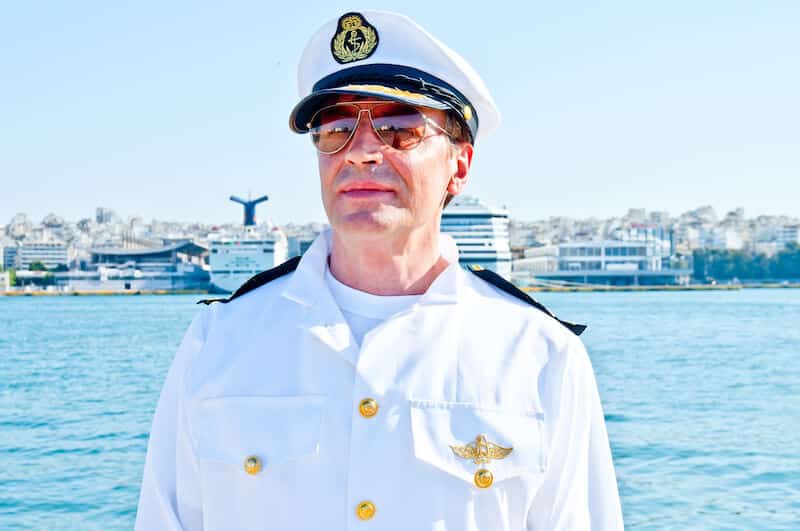
Unlike cargo ships though, cruise ships have multiple departments, divided across deck, engine, hotel and entertainment. Although each department has its own leader, they all have to report to the captain ultimately.
Related reading: Engineering Department Onboard Cruise Ships – A Detailed Guide
Therefore, the role of the captain becomes much more diverse and complex than on cargo ships. A cruise ship captain needs to excel in leadership, management, multi-tasking and decision-making skills in order to be able to successfully preside over the everyday operations of the cruise ship.
While the position of a cruise ship captain is an extremely lucrative, honourable and prestigious rank to hold, it is not without its share of responsibilities. The captain is responsible and answerable for every operation & incident that occurs on the ship under his command.
From manoeuvring the ship in and out of ports, narrow channels , rough seas and heavy weather to overseeing guest comfort and satisfaction, hygiene, quality, food, safety and security, managing ship and shoreside staff, steering committee, managing surveys and coordinating with departmental heads for everyday operations, the captain has to be capable to do it all.
The responsibility of a captain is so huge that they are directly answerable even for mishaps and accidents involving their ships.
Related Reading: How Are Cruise Ships Powered?
Failure to effectively manage crisis situations, make quick & informed decisions and prioritize the safety of lives can be detrimental to the career or in the worst case, the future life of the captain.
The above was highlighted in the case of the captain of the cruise ship Costa Concordia , which met a terrible fate in 2012.
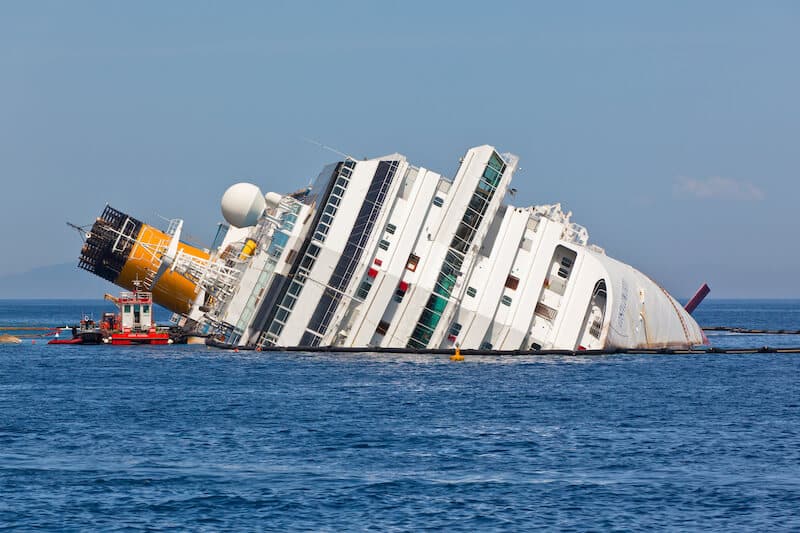
The above vessel capsized after hitting rocks near the island of Giglio near the Italian coast on 13th January 2012. This occurred when the captain ordered the helmsman to steer the ship closer to the island for a maritime salute, a manoeuvre which although the ship had done successfully many times previously was to prove fatal on that night.
Reportedly due to miscommunication between the captain and the Indonesian helmsman, the ship steered closer to the island than usual and by the time the captain realized this and ordered course correction, the ship hit a rock which caused a 174 ft to tear on the port side.
The ship, thereafter started taking in water rapidly and 5 compartments including the engine room got flooded, the ship lost power and started drifting.
Due to wind, loss of propulsion and steering and rapid flooding, the ship changed direction, ran aground and also started listing severely to the starboard side.
The captain, who even after realizing that the ship was flooding, did not immediately call for evacuation or help. In fact, on being contacted by the coastguard, he gave inaccurate information that the ship was only experiencing a loss of power and requested tug assistance.
The result was that by the time he finally gave the order for an evacuation, the ship had started listing severely. In fact, crew members on realizing the grave situation and the captain’s indecision had already launched many lifeboats .
The captain’s indecision, mismanagement of the crisis and concealment of information, in this case, caused the loss of 32 lives as due to the increasing list, more lifeboats could not be launched.
To make matters worse, he fled from the ship even when more than 300 people still remained on board, while it started listing. This included passengers and many crew members.
Despite repeated calls and even orders from an Italian coast-guard officer reminding him of his responsibilities as the captain and for him to return on board, he did not return and shirked from his responsibility of ensuring the safe evacuation of all crew and passengers.
Although with the help of the coastguard and other ships, almost all the remaining persons were eventually evacuated by the next morning, the captain was charged with dereliction of his duties and responsibilities, abandonment of the vessel along with his crew, causing the accident and the death of so many people.
He pleaded guilty despite initially denying and calling himself a scapegoat and was sentenced to a 16-year prison term. Therefore, through the above case, we can understand that how critical the captain’s responsibilities are.
It’s clear that how so ever rosy a captain’s chair and his paycheques may seem, it’s still a highly responsible job as he is accountable for not only his own actions but the actions of other crew-members as well on board his ship.
Qualifications required to become a cruise ship captain
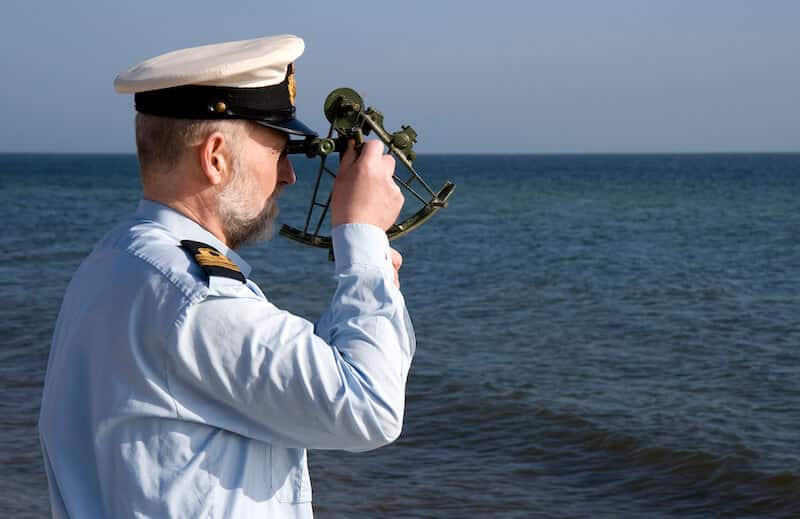
The qualifications required to become a cruise ship captain are not much different from that of merchant ship captains.
A degree or diploma in Nautical Science is followed by onboard training as cadets or apprentice officers lasting several months.
Thereafter, the aspiring candidates are considered eligible for the 2nd Mate examination, on passing which they are qualified to work as 3rd Officers onboard cruise ships.
Further qualifications are acquired by passing subsequent Nautical examinations for Chief Mate and thereafter, Master although there could be some differences in the rules and procedures from country to country.
A Nautical officer on cruise ships too rises through the ranks subject to passing these examinations and also onboard promotions, which depend on performance and experience.
The journey from a Third Officer to a Captain can take several years (usually 15-20 years) as an officer may have to serve at many intermediate ranks for considerable periods of time.
The intermediate ranks are namely Second Officer, First Officer-Navigation, First Officer-Environmental (in many cruise lines this rank is specifically known as Environmental Officer), Chief Officer, Chief Officer-Safety (This rank is also known as Safety Officer), Staff Captain and Captain.
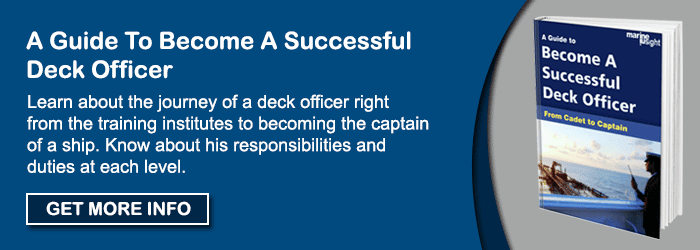
Brief description of ranks on Cruise Ships
Captain: In-command and overall in-charge of the ship. Assumes total responsibility and overriding authority, especially in the matters of safety, security and environmental protection.
Staff Captain: Second in command on board and in charge of the deck/nautical department. Serves as deputy to the captain and should be ready to step into the captain’s shoes in case of unavailability of the captain, emergencies & unforeseen circumstances.
Chief Officer (Safety): Overall in charge of all safety-related equipment, plans, procedures, training and drills onboard.
Chief Officer: Overall in charge of deck operations and maintenance.
Environmental Officer: In charge of overseeing all environmental operations viz. garbage segregation, waste collection & disposal, documentation (ensuring upkeep and updating of environmental record books), upkeep of company environmental policies, local laws of the port state pertaining to environmental protection, environmental training and drills.
First Officer (Navigation): The senior watchkeeping Officer in charge of the Navigational watch on the bridge. Responsible for all navigational and watchkeeping related issues and upkeep of documentation pertaining to them.
Second Officer: Also, an Officer in charge of a navigational watch.
Third Officer: First assistant to the senior watchkeeping Officer in charge of the bridge i.e., First or Second Officer. He reports to the First/Second Officer during a navigational watch on the bridge.
Cadet: Trainee navigational officer, usually a degree or diploma holder, fresh out of a maritime navigational training institution.
Apprentice Officer: Usually a trainee who is undergoing his onboard training as part of a maritime curriculum where the training forms a compulsory part of his degree/diploma course.
The above is a general description of the various ranks of the nautical/deck department and their duties and responsibilities, onboard passenger ships. This is only to give an idea and these ranks and/or duties may vary slightly from company to company.
Related reading: A Guide to Merchant Navy Ranks
Lifestyle and salary of a cruise ship captain
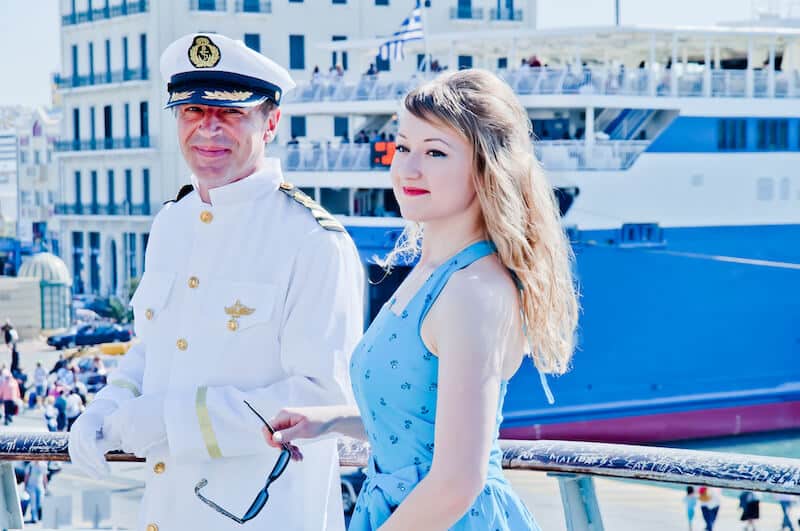
The captain undoubtedly, enjoys a status of a king on board passenger ships, being the ship’s supreme commander, as we have seen and therefore, enjoys many perks and benefits.
These may include five-star accommodation onboard akin to deluxe passenger suites, room-service, company-sponsored first-class flight travel, short contracts of about 2 months and paid vacations, amongst others.
The salary that a cruise ship captain earns is usually in the range of 15000-25000 USD per month, depending upon rank experience, seniority and company pay scale.
To conclude, it would just be fair to say that although a cruise ship captain enjoys a high pay package and many perks and facilities, and is valued as a prestigious position, what comes along with all that glitter is a mountain of responsibility and accountability not only towards his own work but also towards the actions of each and every crew-member on the ship he commands.
He has to lead by example and epitomize excellent management skills in a multifaceted, multi-skilled and multi-disciplinary cruise ship, which has many hundreds of crew-members and thousands of passengers at any given time, as all the crew will look up to him as an inspiration.
He has to ensure that he runs a tight ship by coordinating efficiently with each department on board and the company shoreside.
He also has to make sure that the ship is up-to-date with all the inspections and certifications, is in compliance with all international, flag state and port state rules and regulations.
Most importantly, he should be capable of handling extreme pressure, as he may have to tackle accidents and sudden emergencies (like what happened to the Costa Concordia) and will have to make quick decisions that may impact thousands of lives onboard.
And finally, if after everything, he is unable to salvage his vessel, he will be the one to make the decision to abandon ship and ensure that each and every soul on board is evacuated to safety before himself, because as the captain, he should be the last person to leave the ship, unlike in the case of the Costa Concordia .
Therefore, the crown of the captain may be engraved with many precious jewels, but there is no doubt that it sits heavy on his head!
You might also like to read:
- The Ultimate Guide To Join Merchant Navy
- Watch: Merchant Navy Salary: How Much Do They Earn?
- Joining The Merchant Navy After Class 12th in India
- 8 Things to Keep in Mind Before Joining Merchant Navy
- 10 Reasons Why a Career in Merchant Navy is Unlike Any Other
Disclaimer : The information contained in this website is for general information purposes only. While we endeavour to keep the information up to date and correct, we make no representations or warranties of any kind, express or implied, about the completeness, accuracy, reliability, suitability or availability with respect to the website or the information, products, services, or related graphics contained on the website for any purpose. Any reliance you place on such information is therefore strictly at your own risk.
In no event will we be liable for any loss or damage including without limitation, indirect or consequential loss or damage, or any loss or damage whatsoever arising from loss of data or profits arising out of, or in connection with, the use of this website.

Do you have info to share with us ? Suggest a correction

About Author
Ramanan Sethuraman is a marine engineer who has over a decade of experience in shipping. Having started his career with cargo ships, he later shifted to passenger liners and have sailed with reputed cruise lines. In his free time he likes reading, writing, sports and travelling.
Read More Articles By This Author >
Daily Maritime News, Straight To Your Inbox
Sign Up To Get Daily Newsletters
Join over 60k+ people who read our daily newsletters
By subscribing, you agree to our Privacy Policy and may receive occasional deal communications; you can unsubscribe anytime.

BE THE FIRST TO COMMENT
Leave a reply.
Your email address will not be published. Required fields are marked *
Subscribe to Marine Insight Daily Newsletter
" * " indicates required fields
Marine Engineering
Marine Engine Air Compressor Marine Boiler Oily Water Separator Marine Electrical Ship Generator Ship Stabilizer
Nautical Science
Mooring Bridge Watchkeeping Ship Manoeuvring Nautical Charts Anchoring Nautical Equipment Shipboard Guidelines
Explore
Free Maritime eBooks Premium Maritime eBooks Marine Safety Financial Planning Marine Careers Maritime Law Ship Dry Dock
Shipping News Maritime Reports Videos Maritime Piracy Offshore Safety Of Life At Sea (SOLAS) MARPOL
WAIT! Did You Download 13 FREE Maritime eBooks?
Sign-up and download instantly!
We respect your privacy and take protecting it very seriously. No spam!
- PRO Courses Guides New Tech Help Pro Expert Videos About wikiHow Pro Upgrade Sign In
- EDIT Edit this Article
- EXPLORE Tech Help Pro About Us Random Article Quizzes Request a New Article Community Dashboard This Or That Game Happiness Hub Popular Categories Arts and Entertainment Artwork Books Movies Computers and Electronics Computers Phone Skills Technology Hacks Health Men's Health Mental Health Women's Health Relationships Dating Love Relationship Issues Hobbies and Crafts Crafts Drawing Games Education & Communication Communication Skills Personal Development Studying Personal Care and Style Fashion Hair Care Personal Hygiene Youth Personal Care School Stuff Dating All Categories Arts and Entertainment Finance and Business Home and Garden Relationship Quizzes Cars & Other Vehicles Food and Entertaining Personal Care and Style Sports and Fitness Computers and Electronics Health Pets and Animals Travel Education & Communication Hobbies and Crafts Philosophy and Religion Work World Family Life Holidays and Traditions Relationships Youth
- Browse Articles
- Learn Something New
- Quizzes Hot
- Happiness Hub
- This Or That Game
- Train Your Brain
- Explore More
- Support wikiHow
- About wikiHow
- Log in / Sign up
- Occupations
- Transport Careers
How to Become a Cruise Ship Captain
Last Updated: July 10, 2023 Approved
wikiHow is a “wiki,” similar to Wikipedia, which means that many of our articles are co-written by multiple authors. To create this article, 16 people, some anonymous, worked to edit and improve it over time. There are 8 references cited in this article, which can be found at the bottom of the page. wikiHow marks an article as reader-approved once it receives enough positive feedback. In this case, 85% of readers who voted found the article helpful, earning it our reader-approved status. This article has been viewed 289,658 times. Learn more...
A cruise ship captain is the master of a cruise vessel. Captains usually have a college degree along with years of experience in shipping or naval navigation. They must be very experienced in analyzing speed, weather conditions and other factors that affect a ship's navigation, while controlling a staff of officers. The skills required of a captain include communication, customer service, delegation, and organization. The US Department of Labor Statistics expects the demand for ship captains to go up by 17 percent until 2016, but the competition for cruise ship captain positions will remain competitive. In fact, you may need to finish 4 to 8 years of schooling and obtain decades of experience to qualify. If your dream is to become a cruise ship captain, begin your preparations now and create a backup plan for alternate careers that use the same set of qualifications.
Receiving the Right Education

- In the United States, many aspiring captains attend a Maritime High School, which are generally located on the coasts or Great Lakes. Maritime High Schools are competitive in admissions and follow a particular curriculum established by the U.S. Maritime Administration, emphasizing English, math, and science with additional courses in maritime skills, law, and career training. Because this is such a competitive line of work, a diploma from a Maritime High School is highly recommended to increase your chances of becoming a cruise ship captain.

- The US Government recommends three units of math (algebra, geometry, and trigonometry); three units of English; one unit of physics or chemistry; and eight additional units in additional math and/or science, foreign languages, economics, and social studies.
- If possible, look for part-time work (during evenings, weekends, and summer breaks) in a shipyard or on board a ship or sea-going vessel of any kind. You will learn about ship parts, worker roles, chain of command, and ship repair, as well as gaining experience on the sea, which will help you to know for sure that a career as a captain is ideal for you. If you do not live near the sea or large lakes, try to find summer work on board a ship.

- A diploma and an above-average grade point average in high school are necessary for admission to a Maritime Academy, and even if you do not choose to attend an academy or college, you must have a high school equivalency to gain additional career experience at the helm of a ship.

- Attending a Maritime Academy is the fastest track to move up the ladder on a maritime vessel. Maritime Academies in the United States include California, the Great Lakes, Maine, Massachusetts, Texas A&M, and the U.S. Merchant Academy. These are funded by the United States Maritime Administration to ensure that the government has a steady stream of properly trained merchant marine officers. [1] X Research source
- In the event that you cannot find a position as a cruise ship captain (which is unfortunately a high chance, given how competitive the industry is), a diploma from one of these schools can help you find employment with the US government or as a merchant marine captain. If you are based in another country, seek naval education or experience, according to the best path in your region.
Obtaining Needed Experience and Certifications

- If possible, try to get an internship on a cruise ship. This will help you gain experience and determine that this is the right career choice for you. If you have the opportunity to do more than one internship while in college, try to get one on a cruise line and one on a commercial or government ship. This will help you to see the difference in these career paths.

- Although your career goal is captain, you have to start on the deck to gain needed experience. If you did not get a Bachelor's degree, you will have to spend thousands of hours -- and many years-- gaining experience as a deckhand before you can move up the ship hierarchy and become a deck officer or third mate, which qualifies you to take exams to become a captain. If you did get the Bachelor's degree, you can skip the deckhand stage altogether. [2] X Research source
- The exams test your knowledge and readiness and also entail a thorough background check, including a review of your criminal record and citizenship as well a physical exam and vision and hearing evaluations. There are fees associated with these credentials, ranging from $50 to $100 USD. [3] X Research source

- A Master's degree is not always necessary to get a position, but because cruise ship positions are highly sought after, it might make a difference in your job search. Many cruise ship captains do not have a Master's degree. You will have to decide if your experience is enough or if you could benefit from a Master's degree on your resume; for instance, if you did not attend a maritime high school or Marine Academy, and/or if you have not had many years of experience on a vessel, you may need the additional education to be a viable candidate for a position on a cruise ship. [4] X Research source

- Certification exams require physicals, vision tests, drug screenings and written and practical exams. Merchant marine academies train their students in the topics that will be featured on these exams. People who gain their qualifications through experience may need to take exam prep courses to ensure they pass the exams. There are fees associated with these credentials, ranging from $50 to $100 USD. [5] X Research source

- The marine captain's license also qualifies you for positions with the United States government, including the Coast Guard. [6] X Research source
Finding Work

- In the vast majority of cases, marine captains are promoted after serving as deck officer or third mate on that ship. The time until promotion varies by organization and company, as well as by your own performance in each position.

- For example, most officer positions for Norwegian Cruise Lines are given to Norwegian citizens. The exception is their ship Pride of America, which only hires American citizens. [7] X Research source You will need to check the website of cruise line companies to find out their hiring requirements for particular job openings.

- Continue working as a merchant marine captain. According to the US Bureau of Labor Statistics, jobs in this industry are growing with an expected rate of 14% growth between now and 2022, outpacing the number of new captains available, so the odds of finding a position in a freight ship are much higher than the odds of finding a position as a cruise ship captain. [8] X Research source
- Consider joining the U.S. Armed Forces or working for the U.S. government. Particularly if you attended a State Maritime Academy, the United States seeks capable and well trained captains who can meet its national security needs. [9] X Research source
Community Q&A
Things You'll Need
- High school diploma/GED certificate
- Merchant marine degree
- Deck hand experience
- Rating exam prep course
- Transportation Worker Identification Credential
- Merchant Mariner Credential
- Marine captain's license
- Marine captain experience
You Might Also Like

- ↑ https://www.marad.dot.gov/education/maritime-academies/
- ↑ http://www.allaboutcruisesandmore.com/how-to-become-a-cruise-ship-captain
- ↑ http://www.ecfr.gov/cgi-bin/text-idx?c=ecfr&sid=ae63e8c8b8556b036cfde87e4a7bb8de&rgn=div5&view=text&node=46:1.0.1.2.10&idno=46
- ↑ http://study.com/articles/Ship_Captain_Job_Duties_and_Information_About_Becoming_a_Ship_Captain.html
- ↑ http://study.com/become_a_ship_captain.html
- ↑ https://www.ncl.com/about/careers/shipboard-employment/faq
- ↑ http://study.com/articles/Become_a_Boat_Captain_Step-by-Step_Career_Guide.html
About This Article
To become a cruise ship captain, start by focusing on getting good grades in math, English, and science courses in high school so you’ll be eligible to attend a Maritime Academy after you graduate. While you’re still in school, try to find a job in a shipyard or on board a ship to learn the ins and outs of being at sea. Then, while you’re attending a university, apply for an internship to get practical experience and make connections. After graduation, look for a job as a third mate or deck officer on a ship to develop the qualifications you’ll need as a captain. To learn how to qualify for the marine captain’s licensing exam, keep reading. Did this summary help you? Yes No
- Send fan mail to authors
Reader Success Stories
Susan Altadonna
Oct 12, 2016
Did this article help you?
Conor Russell
Apr 12, 2018
Dalia Rivera
May 17, 2017
Ajay Aloshious
Jun 13, 2017
May 31, 2017

Featured Articles

Trending Articles

Watch Articles

- Terms of Use
- Privacy Policy
- Do Not Sell or Share My Info
- Not Selling Info
Don’t miss out! Sign up for
wikiHow’s newsletter
- Paddle Board

How to Become a Cruise Ship Captain: Everything You Need to Know
Are you dreaming about the glamorous lifestyle of a cruise ship captain? Sailing mega yachts around the world sounds like an appealing experience, right? You’re in charge of a massive vessel, and you’re responsible for thousands of lives aboard your cruise ship.
Being a cruise ship captain is a position of power, and with great power comes great responsibility. Becoming a cruise ship captain takes more effort, training, and experience than just filling out an application form.
It takes years to qualify as a cruise ship captain, and the people that do end up at this level are usually in their 40s and 50s. Being a captain is the pinnacle of a marine career and a life spent on the water. As a captain, you have several important duties, and your commitment to your crew and passengers extends way beyond a welcoming handshake to your guests and a few gala dinners.
So, how to become a cruise ship captain? Is it really the right career path for you? To start, you’ll need a high school diploma and a college degree in maritime studies. Most ships will also require a master’s degree from the applicant.
Along with your qualifications, you’re going to need decades of experience out on the water operating a sea-going vessel. Captains also require correct licensing with the Federal Maritime Authorities.
Quick Facts
How to become a cruise ship captain.
Getting to the status of cruise ship captain isn’t going to happen overnight. So, you need to be sure that you’re willing to do whatever it takes during your career to reach this pinnacle of success. Let’s look at some more of the qualifying criteria for becoming a ship captain.
The primary duty of the cruise ship captain is to manage the staff and crew and make decisions with their safety in mind. Our key responsibilities held by the cruise ship captain include planned scheduled stops and plotting the ship’s cruise course. You’ll also have to know how to read the weather and how it influences ocean conditions.
The captain is solely responsible for the vessel’s navigation, and they may involve themselves in steering the ship, particularly when docking. There are five primary requirements needed to become a cruise ship captain.
- Education, qualifications, and training.
- Career experience working on ships.
- Industry qualifications and certification.
- Captains licensing exams.
- Diverse range of skills.
- Let’s look into each of these factors in detail.

Education and Training
What are the required qualifications for becoming a cruise ship captain? What do I have to study, and how long do I need to study to earn the right degree? These are common questions from people considering a career as a cruise ship captain.
To start your education, you’ll need a high school diploma. You’ll need to go to college and study for a maritime degree, obtaining your B.A. and masters. Marine Engineering and Marine Science are the two best options for your studies, holding the best potential in the workplace in the future.
Your degree will take around four years to complete, and it’s another two to three years for the master’s degree. If you’re in high school and considering a career in the maritime industry, try to go to a maritime college for specialized training and qualifications.
During your studies, you’ll need to work hard to pass your exams and assignments, and you’ll need an above-average grade to qualify for admission into the college. During the summer vacation, try to get a job in the maritime industry.
You could work on board a ship or in a shipyard to gain work experience in the industry. This strategy places you in an environment of continuous learning, and you’ll gain massive amounts of experience over your classmates that choose to spend their summer relaxing.
Working in the summer at a shipyard or on a cruise liner helps you learn about how ships work, the command structure, and the duties of the crew and captain.
After you gain admittance to a maritime college , you’ll need to specialize in your training. Marine Engineering, Marine Science, Marine Transportation, and Ocean Science are some of the top-rated courses available through maritime universities and colleges.
You’ll spend four years studying to achieve your bachelor’s degree, and by the time you finish, you’re going to spend another two to three years completing your master’s degree. Typically, candidates studying for their masters will also be working in the industry full or part-time during their studies.
Attending a maritime university or academy is the best way to fast-track your career prospects due to the specialized training it brings to your qualifications. You’ll have the edge over all the other candidates that don’t have technical maritime degrees.
While a master’s degree is not always a prerequisite for a job as a cruise ship captain, it helps to bolster your case against other candidates that don’t have that qualification.

Work and Career Experience
Having the best degree possible is a fantastic way to build your foundation for a career as a cruise ship captain. However, sometimes a master’s degree isn’t required if you have enough experience captaining other vessels.
Experience brings a sense of confidence and security to the crew and your passengers. If a team has to choose between the qualified guy and the experienced guy, they will go with the experienced captain every time.
After you graduate with your bachelor’s degree, apply for a job as a third mate or deck officer on an ocean-going vessel. These jobs are often entry-level positions on ships and the ideal starting point for anyone who wants a cruise ship captain career.
Every cruise ship captain commanding a sea-going vessel started in these positions and worked their way up the chain of command into the captain’s chair. Some maritime colleges and universities also assist students with applications for maritime jobs.
You also have excellent job opportunities with the Navy Reserve and the Coast Guard Reserve.
If you find a job using these placement services, it lands you with the foothold you need to start gaining experience towards becoming a cruise ship captain.
To apply for these maritime positions, you’ll need to work your way through exams to test your knowledge and physical exams to test your fitness and response in the field. You’ll also have to comply with a criminal background check.

Industry Certification
Industry certifications help to show that you understand the government compliance necessary to operate a cruise ship. Most cruise ships require captains to have a Merchant Mariner Credential and Transportation Worker Identification Credential.
These certifications require you to take more exams and submit to a drug-testing program. You’ll also have to write practical and theoretical exams.
Captain Licensing Exams
Along with your degree, you’re also going to have to take exams issued by the U.S. Coast Guard to qualify as a cruise ship captain. After you have ten years of experience working on commercial vessels, you have the option of taking this exam.
If you pass the test, you qualify to work as a marine captain. You’ll need to work as a marine captain for several years before you can apply for a job to captain a cruise ship. You’ll also have to have an impeccable track record and safety history to qualify for the job.
Diverse Skillsets
As a cruise ship captain, you’ll need a diverse skill set to get through tough situations that require tough choices. You have the entire crew and the passengers under your care, and you need to prepare for any ocean-going possibility that puts the boat at risk.
Cruise ship captains require strong leadership skills and characteristics, and they need plenty of experience dealing with customer relations. You’ll also need administrative skills, strong communication skills, and good problem-solving skills.
Above all, the ship’s captain must have the confidence to stay calm in emergencies and pressure situations.
Ranking Structure on Cruise Ships
Cruise ships operate on a strict command chain. You can think of a cruise liner as a small business. The captain is the CEO, and he leads the rest of the team through the business environment. The ship’s captain has several executive officers that report to them, acting as the company’s vice presidents.
Here is the senior officer structure on a cruise ship.
- Staff Captain
- Cruise Director
- Hotel Director
- Chief Engineer
- Food and Beverage Manager
Cruise ships are large vessels housing hundreds or thousands of people. So, there are different departments handling tasks onboard. Each department comes with managers, crew members, and supervisors.
Some of the departments on a cruise ship include the following.
- Engine Department.
- Deck Department.
- Hotel Department.
- Medical Department.
The rank describes the person’s authority on the ship, and it also provides a job description and title. The rank of crew and officers dictates their role in the working environment on board the vessel. As you rise in rank, you earn stripes for your epaulets. The epaulets have a color-coded classification.
- Deck Departments – Gold and Black stripes.
- Engine Departments – Gold and Purple stripes.
- Hotel Departments – Gold and White stripes.
- Medical Departments – Gold and Red stripes.

If you look at the number of stripes, it tells the individual’s rank on the boat. The more lines the officer has the higher their rank. The captain has four bars, the most of anyone on the ship.
Key Responsibilities of Cruise Ship Captains
As a cruise ship captain, you’re responsible for the safety and well-being of everyone on board, and you’re accountable for any damage or incidents that happen on board while you are in charge of the vessel.
The captain is like the CEO of the ship, and they are aware of every department’s activities and the current status of the workforce. They are the first people to find out when something goes wrong, and they make the final decisions regarding the passengers, crew, and ship.
We can boil down the captain’s duties into nine specific responsibilities.
- Working with crew members and senior officers.
- Navigating and operating the cruise ship.
- Monitoring of the ships position.
- Determining and setting the speed of the vessel.
- Avoiding any hazards in the water.
- Ensuring the maintenance of the ship is up to date.
- Ensuring the correct application and following safety procedures.
- Compliance with international and local law, including flag state policies.
- Compliance with local immigration requirements and customs laws.
The captain is the only person responsible for anything that goes wrong on the ship while he is on board. As a result, the captain must know how to react in the case of an emergency on the vessel. The captain also holds the sole authority to issue the order to abandon the ship.
The captain also has social duties and responsibilities. The captain oversees the arrival and disembarkation of the passengers. The captain will welcome the guests as they arrive and thank them as they leave the vessel.
The cruise ship captain also has the duty of attending and hosting the Captain’s Welcome Party and other events for guests onboard the ship. You might find it surprising that the ship’s captain also has the authority to conduct weddings in international waters.
As a final note, the cruise ship captain is the line of communication between the ship and the home company running the cruises.
Conclusion – How to Become a Cruise Ship Captain
Becoming a cruise ship captain is no easy feat. You’ll need plenty of commitment to your studies and decades of experience out on the water before anyone will consider you for the position. However, if you make it to the top as a cruise ship captain, you’ll enjoy a life of adventure and the respect of all the people on the cruise liner.
It all starts with your desire and what you’re willing to do to achieve your goal as a cruise ship captain. Follow the advice in this post, and take the first step towards your dream career. Good luck in your quest!

John is an experienced journalist and veteran boater. He heads up the content team at BoatingBeast and aims to share his many years experience of the marine world with our readers.
What to Do If Your Boat Engine Won’t Start? Common Problems & How to Fix Them
How to launch a boat by yourself: complete beginner’s guide, how to surf: complete beginner’s guide to get you started.
Comments are closed.
Type above and press Enter to search. Press Esc to cancel.

Home » What Is It Like Being A Cruise Ship Captain?
What Is It Like Being A Cruise Ship Captain?
Last updated on October 21st, 2023 at 09:25 am
Table of Contents
And you thought parallel parking was hard!
Being the captain of a cruise ship is a prestigious and challenging role that comes with a unique set of responsibilities and experiences. Becoming a cruise ship captain is a significant achievement in the maritime industry. It often represents the culmination of many years of hard work, training, and dedication to a career at sea.
Here’s an overview of the skills you need and what it’s like to be a cruise ship captain:
Strong Leadership Skills
As the captain, you are the ultimate authority on the ship. You are responsible for the safety of all passengers and crew members. This includes making important decisions in emergency situations, managing the crew, and ensuring that all onboard operations run smoothly.
Leading a team of skilled professionals on a cruise ship can be personally rewarding. Captains work closely with a diverse crew and have the chance to mentor and guide their team members.
Proficient In Navigation
One of the captain’s primary duties is navigating the ship. This involves plotting courses, reading nautical charts, and using advanced navigation systems to ensure the ship reaches its destinations safely and on time.
A cruise ship’s captain must also consider weather conditions, currents, and other factors that may affect the voyage.
For those of us who find parallel parking a challenge, docking a cruise ship is a complex procedure that needs careful planning, communication and skill. Ships have a propulsion system and side thrusters to help with the process, but can also get assistance from tug boats. All-in-all, it takes skill to make docking a smooth experience.
Unblemished Safety Record
Safety is paramount on a cruise ship. Captains must conduct safety drills, ensure compliance with international maritime regulations, and be prepared to respond to emergencies such as fires, medical incidents, or passenger and crew evacuations.
Each day on a cruise ship can bring new challenges and experiences. A captain needs to be able to handle any and all emergencies to keep everyone on board safe. From navigating complex waters to managing emergencies and interacting with passengers from around the world, the job rarely gets monotonous.
Excellent Communication With Crew And Passengers
Effective communication is essential. Captains must coordinate with various departments on the ship, including the bridge crew, engineering staff, and hotel operations. They also communicate with port authorities and other vessels at sea.
They are also dealing with a diverse set of crew and many cultural differences. The Captain must find a way to create cohesion among all those entities on his or her ship.
Although limited, cruise ship captains often have the chance to interact with passengers during special events and gatherings. These interactions can be enjoyable and provide a sense of connection with the people they serve.
Ability To Work Long Hours
Cruise ship captains often work long hours and may spend several months at sea without a break. The job requires a strong work ethic and the ability to stay focused and alert even during extended shifts.
While the job can be demanding with long hours at sea, it often provides opportunities for extended periods of time off between contracts. This can allow captains to balance work and personal life in a unique way.
Cultural Awareness
Cruise ships host passengers from around the world. Captains need to be culturally aware and sensitive to the diverse backgrounds and expectations of their guests.
Ability To Assume Responsibility
Captains are responsible for the well-being of their crew members. This includes ensuring that the crew has appropriate training, accommodations, and support services.
Captains are entrusted with the safety and well-being of everyone on board, and this level of responsibility can be very fulfilling. Knowing that you are responsible for the safe navigation of a massive vessel and the protection of passengers and crew can be a source of pride.
Maintain Regular Maintenance and Inspections
Regular maintenance of the ship is crucial to its safe operation. Captains oversee routine inspections and maintenance tasks, working closely with the ship’s engineering and maintenance teams.
Comfortable With Passenger Interactions
While captains may not have extensive direct contact with passengers, they often participate in formal events and may interact with passengers during receptions or special occasions.
Climbing The Ladder
Becoming a cruise ship captain typically requires years of experience as a deck officer, followed by advanced maritime training and obtaining the necessary licenses and certifications. Many captains have worked their way up through the ranks of the cruise industry.
Love of the Sea
Despite the demanding nature of the job, many cruise ship captains have a deep love for the sea and a passion for travel. They get to visit exciting destinations around the world, although their time ashore is often limited.
Many captains have a deep love for the sea and a strong connection to the maritime environment. Being on the water and experiencing the ever-changing moods of the ocean can be a powerful and spiritually enriching experience.
Final Thoughts
It’s important to note that while there are many rewarding aspects of being a cruise ship captain, the job also comes with its share of challenges and sacrifices, including extended periods away from family and friends and the need to manage high-stress situations.
Ultimately, the best thing about being a cruise ship captain may vary depending on the individual’s perspective and personal preferences.
Being a captain of a cruise ship is a prestigious and challenging career that demands a high level of responsibility, leadership, and maritime expertise. It offers the opportunity to travel the world and experience a unique blend of adventure and professionalism.
However, it also requires a strong commitment to safety and a willingness to work long hours in a highly regulated and complex environment.
Questions That Ship Captains Have Been Asked
Captains have had their fair share of questions from passengers, and many cruise lines offer a “Q&A” sessions with the Captian and other officers of the ship. If you ever have the opportunity to attend one, it is worth the time.
Here are some real questions that have been asked:
Is there a jail onboard? Yes, there is. It is called the brig.
How many people die on a cruise each year? An average of about 200 people each year die while on a cruise , most of those due to a cardiac event. With about 31.5 million people cruising each year, that isn’t a bad average.
Could I steer for a while? No.
Am I on a ship or a boat? You are on a ship. The best way to remember this is, you can put a boat on a ship, but you can’t put a ship on a boat.
Who steers the ship when you are sleeping? There are always two captains onboard a cruise ship. A Ship’s Captain and the Staff Captain as well as a number of officers.
Have you ever left a passenger behind? No. However, there have been occasions when a passenger decided not to be on board when we sailed.
Does the crew sleep on board? (Really?) Yes they do.
This page contains affiliate links for which we may receive financial compensation when a purchase has been made through one of our affiliate partners.
About Jonathon Hyjek
Jonathon is the tech guy behind CruiseportAdvisor.com. When he's not stuck in front of his computer, Jonathon enjoys travel & cruising (even after being on a cruise ship that caught fire - a story for another day!)
RECENT POSTS
Cruise news this week, what does it take to keep cruise passengers fed, royal caribbean cruise line loyalty programs: sailing to rewarding adventures, retirement home vs life at sea on a cruise ship, do i need travel insurance for a cruise, the pros and cons of cruising on a smaller cruise ship, grab your tour with cruise port advisor now, a short description introducing your business and the services to visitors..
© 2023 cruiseportadvisor All Rights Reserved.
- Book Excursions
- Anchorage, AK
- Baltimore, MD
- Cape Liberty, NJ
- Charleston, SC
- Ft Lauderdale, FL
- Galveston, TX
- Honolulu, HI
- Jacksonville, FL
- L.A. (San Pedro), CA
- Long Beach, CA
- Montreal, QC
- New Orleans, LA
- Norfolk, VA
- NYC – Brooklyn
- NYC – Manhattan
- Port Canaveral, FL
- Quebec City, QC
- San Diego, CA
- San Francisco, CA
- San Juan, PR
- Seattle, WA
- Vancouver, BC
- Whittier, AK
- Alaska & Pacific Northwest
- Central & South America
- Cruise Ports in Bermuda
- Dominican Republic
- Mexico & Mexican Riviera
- Eastern Canada & Quebec
- New England
- Los Angeles (San Pedro), CA
- Fort Lauderdale, FL
- Cruise Blog
- Cruise FAQ’s

Cruise Ship Ranks and Hierarchy
Working on a cruise ship is a unique environment. Although one may argue that it’s just a floating resort, a look closer identifies that hierarchy and ranks are embedded in each cruise job onboard. By understanding the difference in stripes and ranks you’ll get to know how the chain of command works on a cruise ship.
Overview of Cruise Ship Hierarchy
A cruise ship is run like a small corporation. Similar to the president of a company, the Captain is in charge and is ultimately responsible. The Captain has a handful of senior officers that report to him just like a handful of vice presidents that would report to the president of a company. Beyond those high level ranks, the larger the cruise ship, the bigger the organizational chart of other ranks and cruise ship jobs that there are.
Typically, each department has a department head, managers, supervisors and crewmembers. (The actual title of each cruise job varies by cruise line). This equates to a chain of command that all those working onboard must adhere to. Another term for cruise job is rank. The rank of all officers and crew on cruise ships governs not only their working environment but also their cabin assignment, where they eat, their emergency duty, and whether or not they have access to passenger facilities.
History of Hierarchy and Rank on Cruise Ships
When you look at both naval ships and cargo vessels, there has always been a strict hierarchy of command. Maritime laws govern safety of life at sea with regulations that must be followed by all officers and crew working onboard the vessels. The Golden Era of ocean liners evolved into the cruise industry today where cruise ship safety is also paramount.
In the past, cruise ship hierarchy was a very militarized organizational structure with lower ranks rarely questioning the authority of higher ranks. In addition, only few departments such as the Deck Department and the Engine Department wore stripes to indicate their officer status.
Although there are many differences in how cruise ships are managed today, the officer ranking system continues to be in place and has inevitably been expanded. In an interview with Royal Caribbean’s Captain Erik Standal for the website, Beyond Ships, Standal explains that the traditional militarized hierarchy on cruise ships is still necessary.
“We are a small community and in a community you have to have some order to control certain people.” He points out, “You have the ranking system in order to make it clear who is making the decisions…”
Cruise Ship Management Hierarchy
On today’s cruise ships, in addition to the Captain being in charge, there are a handful of senior officers that manage the ship’s operations and report to the Captain. These jobs include Staff Captain, Chief Engineer, Hotel Director, Cruise Director, Doctor, Food and Beverage Manager, and Staff Engineer.
Each of those department heads have managers and supervisors that report to them as well. (See the Cruise Ship Job Positions for more information.) Plus, each department is responsible for specific emergency duties.
Cruise Ship Officer Stripes
When you first start working on a cruise ship it may be overwhelming to understand how all the departments work together, who’s in charge of what and who reports to whom. Getting to know how to interpret the stripes on their epaulets is the first step. (Reading the officer’s name tag is an alternate method). For starters, each department’s stripes are represented by a specific colour of stripe.
- Deck Department – Black and gold stripes
- Engine Department – Purple and gold stripes
- Hotel Department – White and gold stripes
- Medical Department – Red and gold stripes
The number of stripes indicates the rank of the officer. The more stripes, the more authority the officer has within their department. Each cruise line varies slightly with how many stripes a particular cruise job may have. In all cases, the Captain has the most stripes (4+ black and gold stripes)
Comparatively, in the Hotel Department, the Hotel Director is the head of his/her department. He/she may have four stripes. This person looks after all guest services, entertainment and revenue on the ship. Therefore, the Cruise Director, Doctor, Food and Beverage Manager, Customers Services Director, and Human Resources Manager all report to the Hotel Director and typically have between 3 – 3.5 stripes.
In some cases it’s difficult to tell who’s who on a ship because there are so many people wearing stripes. (Note: Some cruise jobs may not actually wear stripes but their job has a stripe equivalent in the case of the Cruise Director.)
Cruise Ship Chain of Command
Each cruise line has a slightly different organizational chart when it comes to the chain of command. Yet, most cruise lines follow the same chain of command protocol.
Click here for a simple diagram of cruise ship organizational hierarchy .
On cruise ships, you are expected to follow the chain of command whenever you have a complaint or concern. Always speak to your immediate supervisor first and allow them to make an effort to solve the issue. At no time should you jump the chain of command and proceed directly to the Captain.
When the Chain of Command Breaks Down
There may be times when you feel that your immediate supervisor has not dealt with the issue at hand. Or, possibly your immediate supervisor is the issue. If that’s the case, you take it one step up the chain of command and speak with the next in line.
Most cruise ships also have a Human Resources Manager onboard. This person is onboard for situations that you feel that can’t be resolved within your own department and also for situations that you feel are sensitive or personal. Feel free to speak this onboard HR manager.
All in all, working onboard a cruise ship can take a bit of getting used to, with its overly structured environment. But, once you experience it, you appreciate it. You know exactly what you can and cannot do. You know what your responsibilities are. You know who you need to report to. This military style is not for everyone, but many crewmembers and officers careers thrive in this environment.
We use cookies to ensure that we give you the best experience on our website.
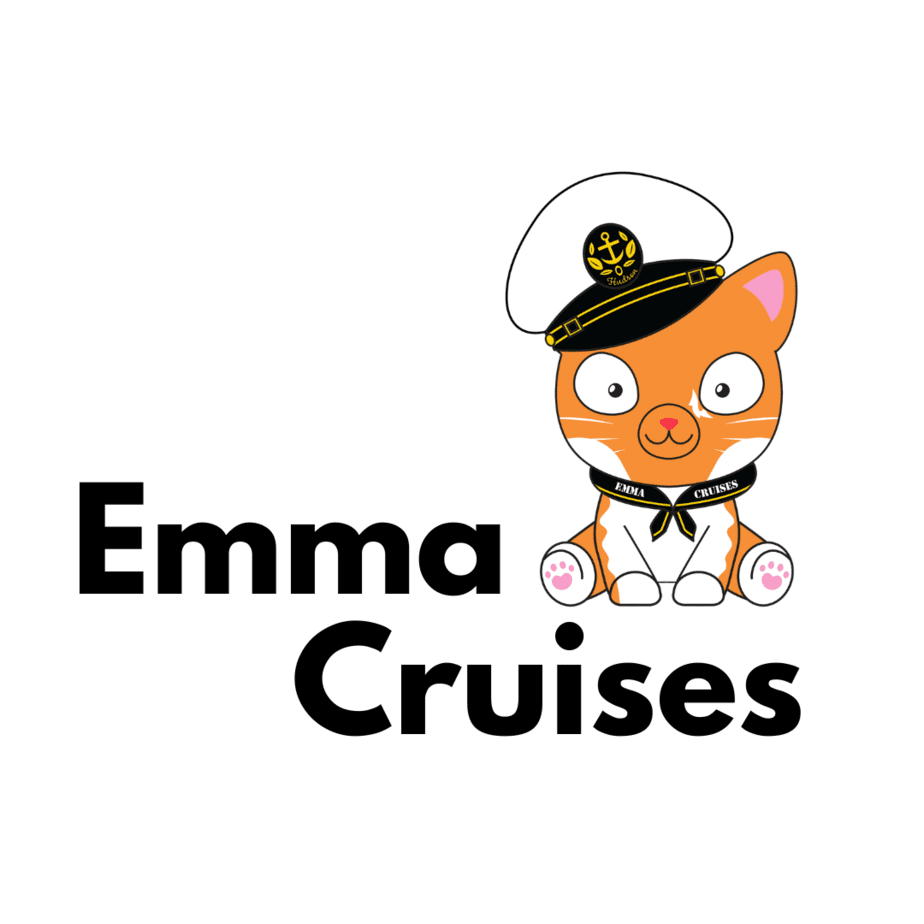
The Untold Truth About How Much a Cruise Ship Captain Earns (And What They Do)
On every cruise, you will find a Captain. The Captain is well known for being the person in charge of sailing the ship but a captain’s job is much more than this.
In this article, we explore everything that a cruise ship Captain does and look at how much a cruise captain can expect to earn.
What is a Cruise Captain?
A cruise captain is responsible for the overall cruise operation.
The safety of the guests and crew is primarily the responsibility of the captain and the captain is in charge of sailing the cruise ship between ports.
The captain also is in charge of various social activities onboard and is usually a recognisable face on most cruises.
Being a cruise captain is an incredibly difficult and demanding job, cruise captains often work for long periods and are responsible for many things onboard the ship.
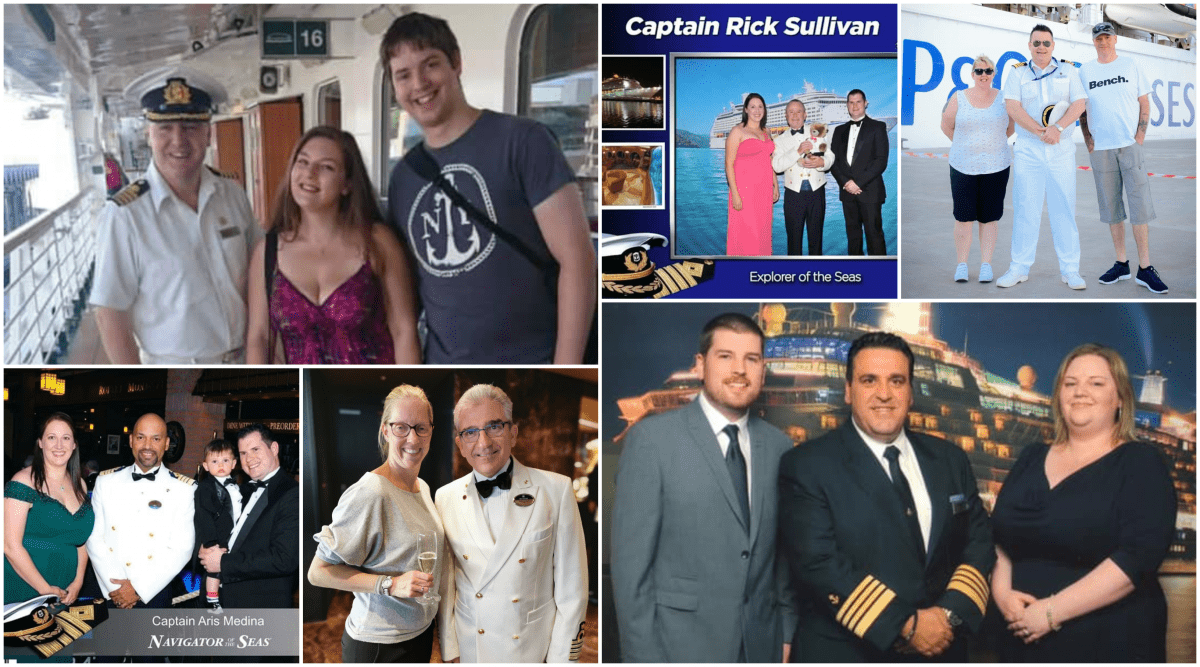
Cruise Captain Job Roll – What do Cruise Captains do?
Piloting the ship and avoiding hazards.
The primary focus of a cruise ship captain is to make sure that all guests and crew get from point A to point B safely.
Safety is the primary motivator behind everything that a cruise ship captain does.
A notable example of where this wasn’t the case was the Costa Concordia disaster of 2012 where the captain decided to take a different route closer to land.
The cruise ship hit a rocky sea bed, capsized and 32 people lost their lives.
Traditionally a captain must always ‘Go down with the ship’ meaning that the captain shouldn’t leave the ship until the last person on board has left.
Once again, this wasn’t the case in the Costa Concordia disaster, captain Francesco Schettino abandoned the ship with guests still onboard.
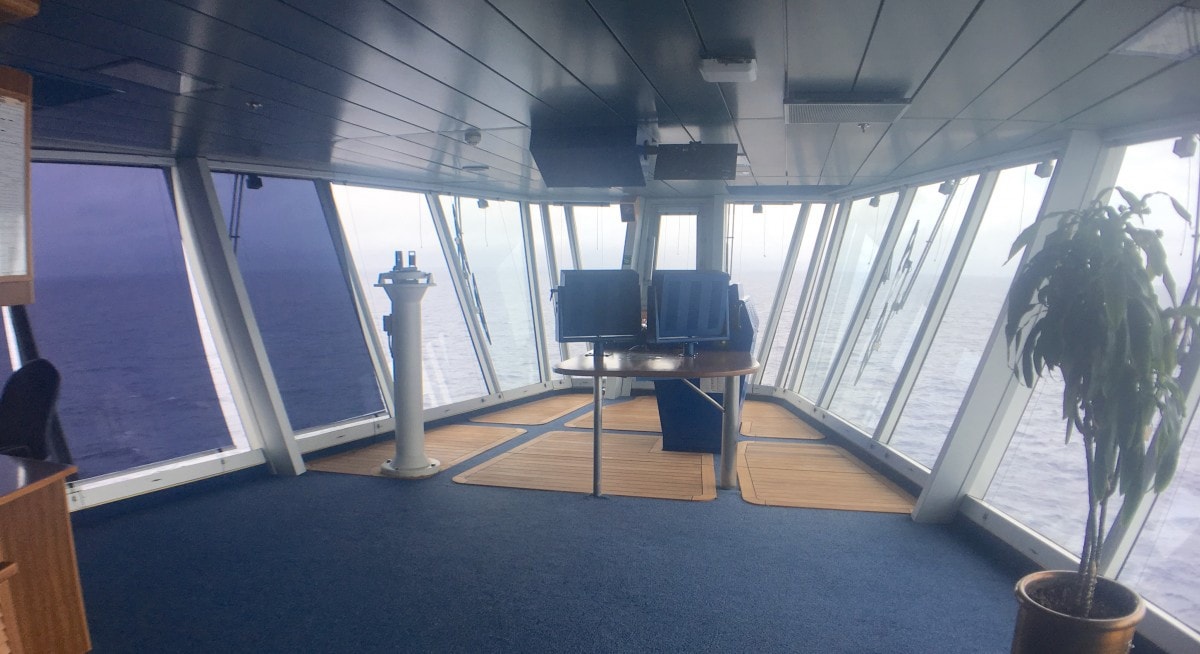
Supervising the Maintenance of Various Pieces of Onboard Equipment
On a cruise ship, you’ll find various teams who will look after different parts of the ship, the engines, and navigational equipment, for example.
The cruise ship Captain is generally speaking the person who oversees all of this and has the final say on most things. Cruise ship Captains have to have a wide knowledge on a variety of subjects.
Rather unsurprisingly the job of a cruise ship captain also comes with a lot of paperwork!
Marrying Couples and Shaving Heads
It’s quite common for the captain of a cruise ship to be a prominent part of guest’s weddings if they choose to get married on board. They also conduct wedding renewals.
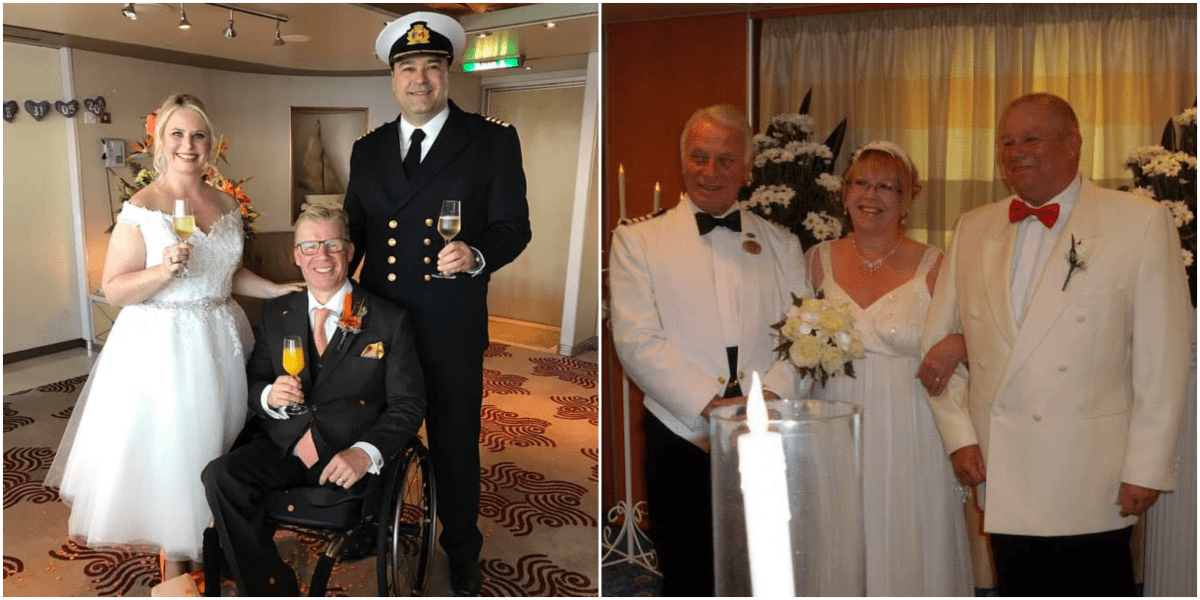
What is less common is shaving the heads of passengers!
That said, I let the captain of the cruise ship shave my head, yes really! I was taking part in ‘Brave the Shave’ to raise money for a cancer support charity.
We raised £5000 and you can watch the video here:
Managing a Large Team of Officers and Crew
On every cruise ship, you’ll find a variety of staff members who work on the bridge.
There are usually quite a few officers, safety officers, and cadets, all of whom work together to ensure a smooth safe sailing.
The Captain is the head of this hierarchy and can often have many crew members beneath them. The crew will take turns working in shifts to ensure that the bridge is always manned.
Each crew member will have specific tasks and jobs to complete and the Captain oversees each member to ensure that everything is done correctly.
The rank of the officers/captain can be seen on their epaulettes. An epaulette is a shoulder piece on an item of clothing, generally speaking, the more stripes the more senior the member of the team is.
Enforcing Security Plans
All crew members onboard cruise ships have drills and procedures that they have to practice in case of emergency. On cruise ships, there are drills for almost anything that you can think of.
The most common would be a situation like a fire or a flood – but cruise ships do also practice Pirate Drills in case of Pirate attacks. The cruise ship captain is in charge of safety and security plans like these.
To learn more about the very rare instances of cruise ships being attacked by Pirates, check out the video below:
At the Muster Drill which all guests must attend the captain usually plays a prominent role and will speak to the guests over the overhead tannoy.
It’s ultimately the responsibility of the Captain to make sure that their ship complies with legal obligations and having all guests attend Muster is part of this.
To learn more about muster drills, including what happens if you don’t attend, check out this post:
What is a Muster Drill on a Cruise? Everything You Need to Know (REVIEW of Traditional and Virtual Muster Drills)
Social Events
A big part of the Captain’s job is to attend social events around the cruise ship. You’ll often see the Captain interacting with guests and they may make some form of welcome speech at the start of the cruise.
Top tip: The Captain’s welcome drink is a great place to go if you’d like a free drink! You can usually pick up a drink (or two) just by being in the right place at the right time so it’s well worth attending.
The captain will also have photos taken with guests and may even dine with a select group of guests.
My favourite cruise ship captain is Captain Wesley who you’ll find on P&O ships, meeting him was a delight! You’re in for a treat if you cruise with P&O and have Wesley as a captain …
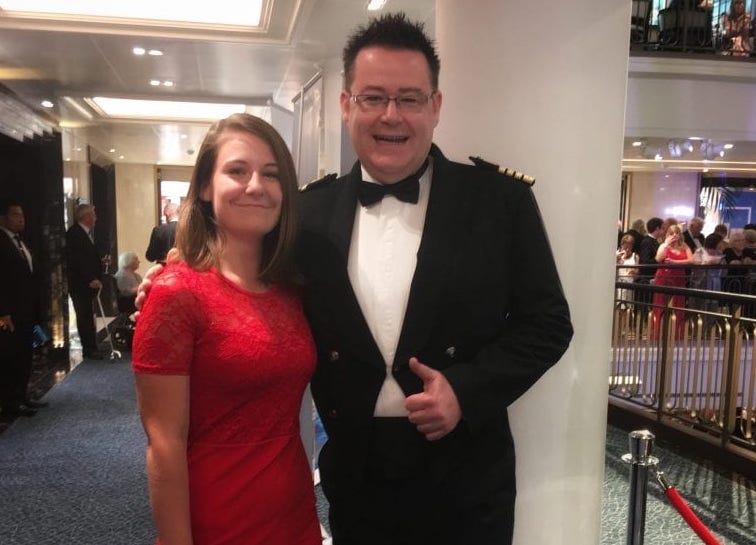
Tannoy Announcements
Cruise ship Captains will often be responsible for speaking to guests over the tannoy and explaining things about sailing – such as the cruise route, weather, and speed.
A Cruise Director will usually do the most announcements -informing guests about the entertainment and events going on onboard.
To learn more about cruise directors, including how to become a cruise director, check out this post:
What Do Cruise Directors Do? How Much Do They ACTUALLY Earn?
Do River Cruise Ships Have Captains?
All river cruise ships have Captains but because river cruise ships are much smaller they don’t require the large bridge team that ocean ships have.
A river cruise ship will usually only have one Captain who will be responsible for all of the sailing of the ship.
The river cruise Captain has similar responsibilities when it comes to safety and planning.
The Captain will usually introduce themselves at the start of the cruise and may also attend farewell drinks at the end of the voyage.
On many river ships, you are able to see and speak to the Captain when he is steering the ship from the Wheelhouse on the top deck – as long as you don’t distract him, of course!
Find out more about river cruising in the video below:
How do You Become a Cruise Captain?
To become a cruise ship Captain you must have a good education and put in the time required to learn the skills needed.
Most cruise ship Captains will have a degree in something like maritime science, maritime engineering, or something similar.
After graduating most cruise ship Captains will find a job at sea and spend many years working their way up through the ranks. The majority start as cadets before progressing on to become officers and eventually Captains.
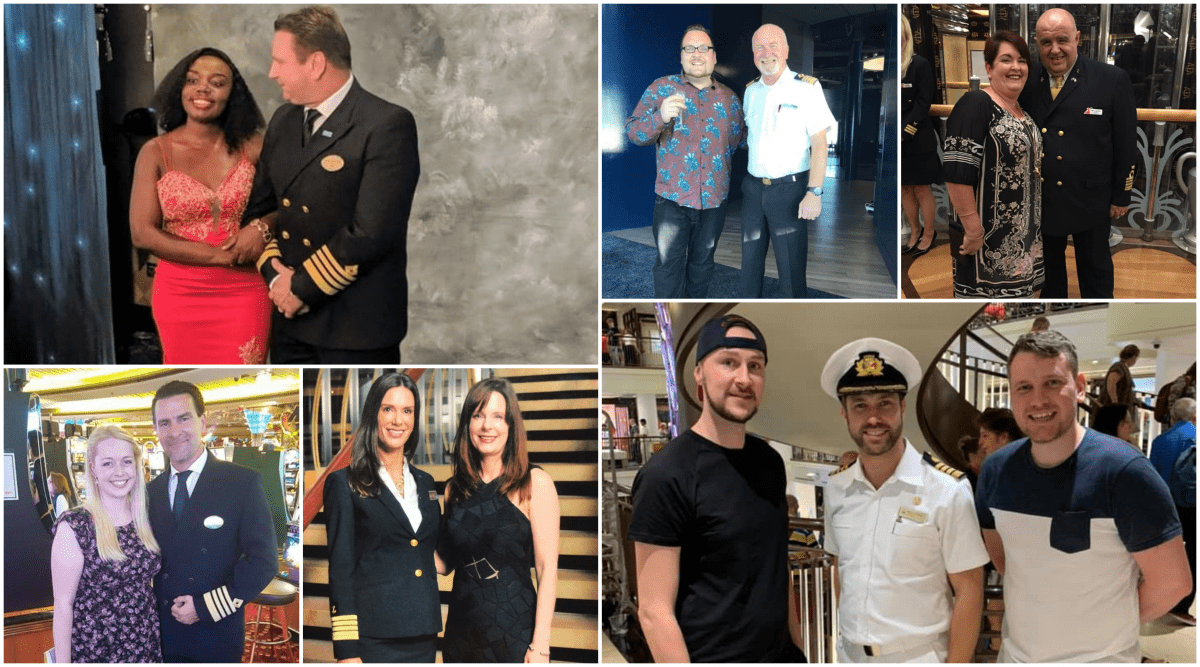
Cruise Captain Entry Requirements:
What skills do you need to become a cruise captain.
Cruise captains must be organized, strong leaders and have the highest quality communication skills.
It’s important to be able to stay calm under pressure as well as multitask.
Cruise captains are at sea for long periods of time and must be able to work at all hours of the day.
Public speaking and being personable is always a bonus and appreciated by guests.
Are You Able to Visit The Captain On The Bridge of a Cruise Ship?
Usually, No!
Sometimes you are able to take a “Behind the scenes tour” of the the ship, but these rarely include a bridge tour.
Sometimes you can be specially invited onto the bridge of a cruise ship, you may then be lucky enough to meet the Captain or some of his senior crew. This happened to me onboard Symphony of the Seas.
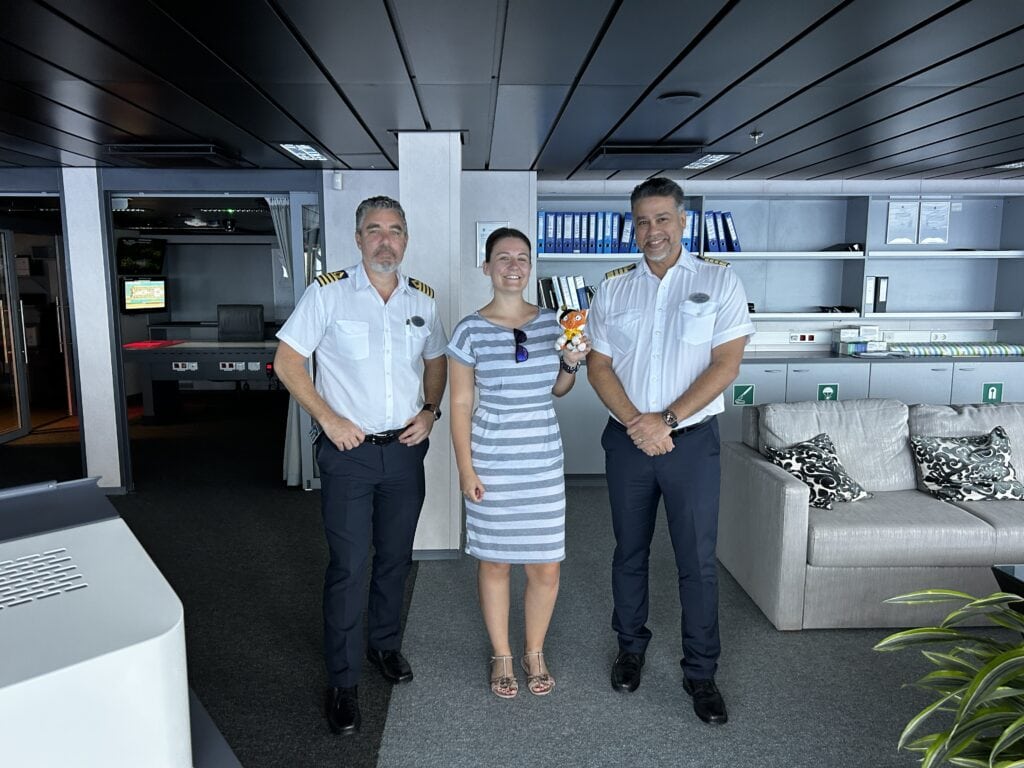
When I cruised on the luxury ship Emerald Azzurra, which only has 100 passengers, I was able to go to the bridge whenever I wanted as they have an “Open bridge policy.”
This Open Bridge policy isn’t something that is possible on most Ocean-going cruise ships, that hold thousands of passengers.
Find out all about that memorable cruise below.
What is the Salary of a Cruise Captain?
The average salary of a cruise Captain is $130,000 per year. Salaries range from $52,000 to $190,000. This is dependent on the Captain’s experience, and the cruise line for which they work.
According to Cruise Critic ( source ) the average salary of a cruise ship Captain is $150,000 per year.
Pay Scale ( source ) estimates an average salary of $52,000 – $127,000 per year.
The National ( source ) suggests between $153,379. per year.
The Guardian ( source ) estimates a salary of $164,000- $190,000 per year.
There is, of course, a lot of variety within the salary of cruise Captains.
The size of the ship that the Captain is sailing and the size of the company that the Captain works for will make a difference to the salary he receives.
Generally speaking though, the captain is one of the highest-paid members of the crew on board – and rightly so!
What Other Perks Do Cruise Captains Receive?
In addition to salary cruise captains receive a number of other perks:
- Accommodation on the ship free of charge
- Family staying onboard
- Meals onboard
- Laundry and Housekeeping
- Discounts, often on cruises and/or shops onboard
Because Cruise captains live at home for long periods they are usually able to send the majority of their salary home and have very little onboard expense.
Another big perk to mention is that cruise ship captains get to visit some amazing places on their journeys.
Related Questions:
How much did the Costa Concordia Captain Make?
It’s estimated that the captain of the Costa Concordia earned between $52,000 and $190,000 per year.
Before You Go
Another place you rarely get to see the inside of are the ship’s lifeboats. Find out more about what would happen in an emergency, what food they keep onboard, water supplies and more in this “behind the scenes” tour:
Inside a Cruise Ship Lifeboat (Crew Tour) – Emergency Food, Engine, Seating Plan and More
Find out all about the obstructed view cabin I had onboard Spectrum of the Seas. The view was 50% yellow lifeboat! Find out what I thought of that here:
Obstructed View Balcony Cabin – This Controversial Cabin Surprised Me!

Free Insiders Cruise Line Guide
Ever wondered how the mainstream cruise lines compare? Cruise lines won’t tell you this, but I will.
This FREE guide shows you everything you need to know to find your perfect cruise line.
Whenever I take a cruise I order a print of my trip. It uses the real satellite data from the cruise and is always a great conversation starter!
I'm building an impressive collection...
Code EMMACRUISES will get you 10% off

Enter your email address below:

How Much do Cruise Ship Captains Make? (Salary 2024)
Have you ever wondered how much does a cruise ship captain make a year? The exact amount can vary depending on several factors, including experience, the size and prestige of the ship, and more.
It’s estimated that cruise captains make an average of $96,000 a year. Some may even earn upwards of $200,000 per year while at the other end of the spectrum for small vessels and those newly promoted to the position make approximately $50,000 annually.
Read on to see how we arose at these figures and the various factors that influence the amount.
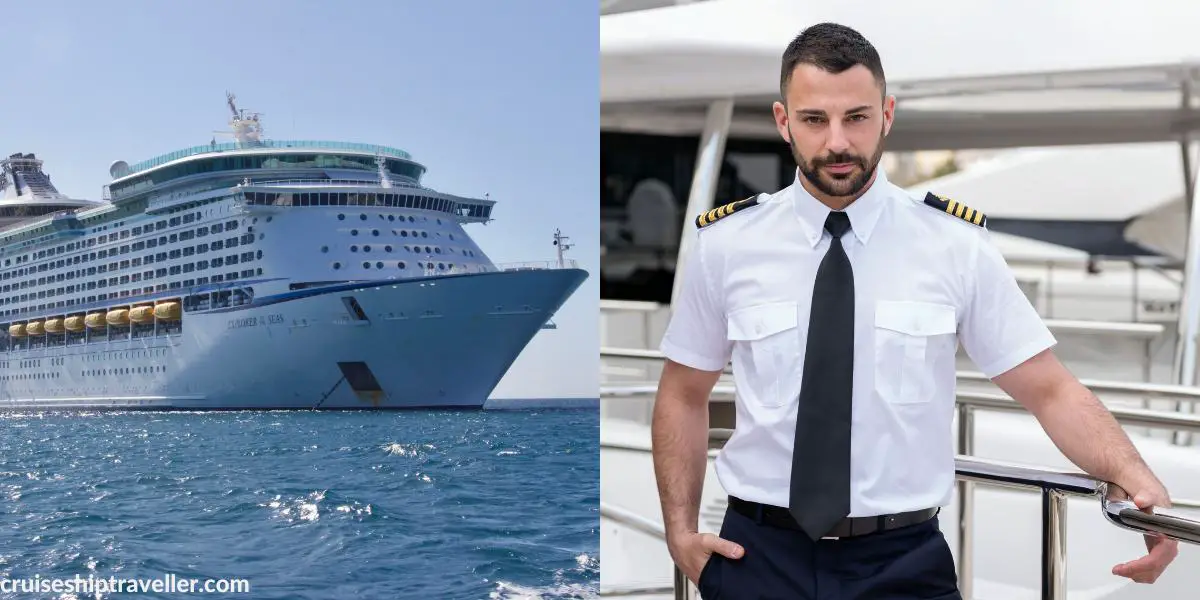
What is the Average Cruise Ship Captain Salary?
According to Comparably , a US Cruise captain on average earns a US$93,328 annual salary.
Another source of cruise captain salary data is from Payscale which indicates a ship captain’s average salary at US$ 96,347 a year.
From their stats, we can see they estimate the bottom 10% earn $48,000 a year and the top 10% $190,000 a year.
Interestingly they also break down estimated earnings by “Pay by Experience Level for Ship Captains”.
On average the ship captains with under 10 years of experience earn on average of US$70,000 to $77,000 a year, compared to those with over 10 years expecting to earn US$98,000.
Bear in mind the Payscale stats are based on “ship captains” and not specifically cruise ship captains, but we can expect the earnings to be in the right ballpark as they are on par with the Comparably stats.
However, this is just an average, and as you most likely know there is a wide range of cruise ship sizes, from those that carry 100 to 200 passengers to mega-ships that carry and are responsible for over 5000 passengers as well as 1500+ crew members.
So in this post, we look at the factors that influence a cruise captain’s annual salary and how much they make a year plus a look at some of the added perks of the job to be added on top.
Average Cruise Ship Captain Salary Per Month
Taking the average salary of cruise ship captain at US$93,328, this equates to a monthly average salary of US$ 7777.33.
We have also worked out the monthly salaries for those cruise ship captains earning higher annual salaries as follows:
- $125,000 a year equates to US$ 10,416 a month
- $150,000 a year equates to US$ 12,500 a month
- $175,000 a year equates to US$ 14,583 a month
- $200,000 a year equates to US$ 16,666 a month
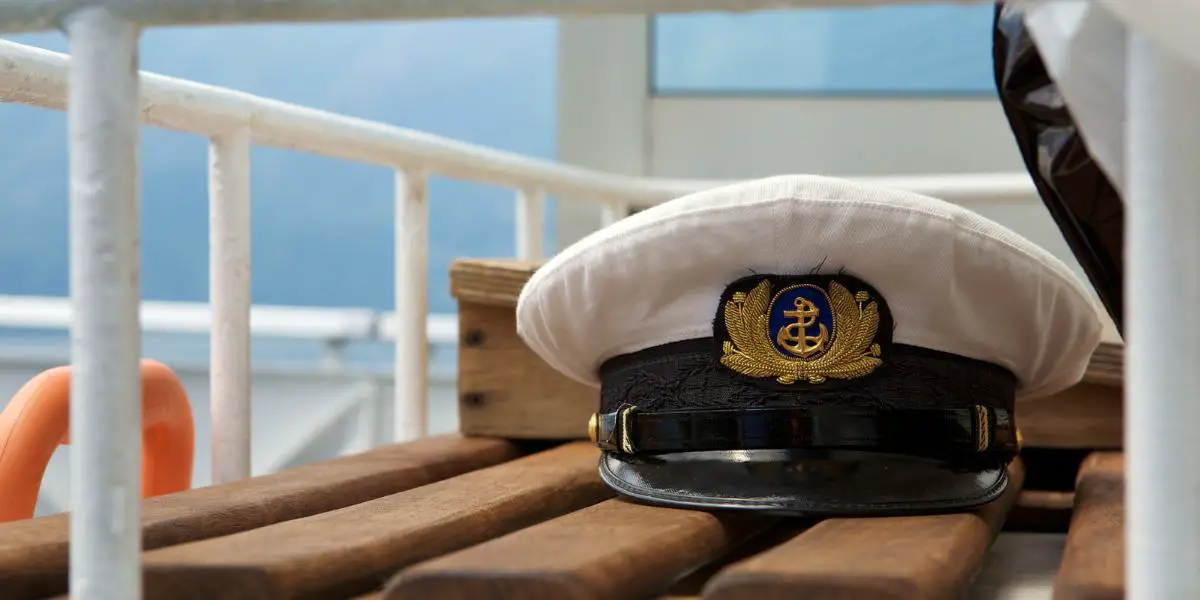
Factors That influence Cruise Captain Pay
There are a number of factors that have an impact on how much a cruise captain can expect to get paid a year.
Years of Experience
One of the most important factors determining a cruise ship captain’s pay is their experience.
A newly qualified captain with little experience can expect to earn much less than a captain who has been sailing the seas for many years.
It’s not unusual for a cruise line to require that a captain has at least 10 years of experience before they can be considered for the role, including a number of those as Staff Captain, which is the second in command.
Quite simply, the more years of experience they have as an actual captain, the more they can expect to be paid.
Size and Prestige of Vessel
The next big factor is the size and type of vessel they are the captain of.
Generally, the larger the vessel, the more responsibility the captain has and the higher their salary will be.
Of course, there are other types of vessels such as smaller luxury cruises or cruise ships that have to navigate particularly difficult waters. These types of cruises will often pay their captains a little more to account for the extra skills and experience required.
Company Size
The size of the company can also affect a cruise ship captain’s salary.
For example, a small company that only operates one or two vessels will not be able to pay its captain as much as a large corporate company with dozens of ships.
However, it is worth noting that some of the smaller companies may be more willing to negotiate on salary and offer other perks, such as a share of the profits, which can make up for the lower salary.
The final factor we want to mention is location.
Captains who are based in Europe or North America will generally be paid more than those based in other parts of the world, such as Asia or South America.
This is because the cost of living is higher in these regions and companies need to pay their captains enough to cover their basic expenses.
Extra Benefits/Perks of Being a Cruise Captain
As well as a well-paid salary, a cruise captain may also be entitled to the following perks:
- Luxury suite accommodation which includes rooms for guests
- Room and Laundry service
- Use of the ship’s facilities, such as the gym and spa
- Free flights
- Paid Holidays
- Health and Dental plans
What is a Cruise Ship Captain?
A cruise ship captain is a hugely responsible role overseeing all crew departments involved in the overall operation of the vessel.
The captain is in charge of many aspects including navigation, safety, security, maintenance, crew, and passengers.
They need to have an in-depth knowledge of maritime law and be able to navigate using both modern technology and traditional methods.
The captain is responsible for maintaining the ship to a high standard and ensuring that all aspects of safety and equipment are in good working order.
It’s a role that can take years of maritime experience and training to achieve.
Responsibilities of a Cruise Captain
The captain of a cruise ship is responsible for the lives of everyone on board as well as the safe operation of the vessel.
The captain of a cruise ship is also responsible for the crew and will need to ensure that they are properly trained and aware of their roles and responsibilities and carry them out to the best of their ability.
Let’s look in more detail at each of the main roles of the captain of a cruise ship.
Navigation of the Cruise Ship
The most obvious role of the cruise ship captain is to navigate the vessel to required destinations.
The captain will also be responsible for charting the course of the ship, taking into account weather conditions and other factors that could affect the safe passage of the vessel.
In addition to this, the captain will also need to determine the speed of the ship and make sure that it is within the safe limit to reach destinations at the correct time.
The captain will also be responsible for making sure that the ship stays within the safe waters and does not stray into dangerous areas, avoiding any hazards that could potentially damage the ship or put the lives of those on board at risk.
This will also include making the decisions of when to leave ports in the event of passengers not onboarding on time, and possibly leaving them behind.
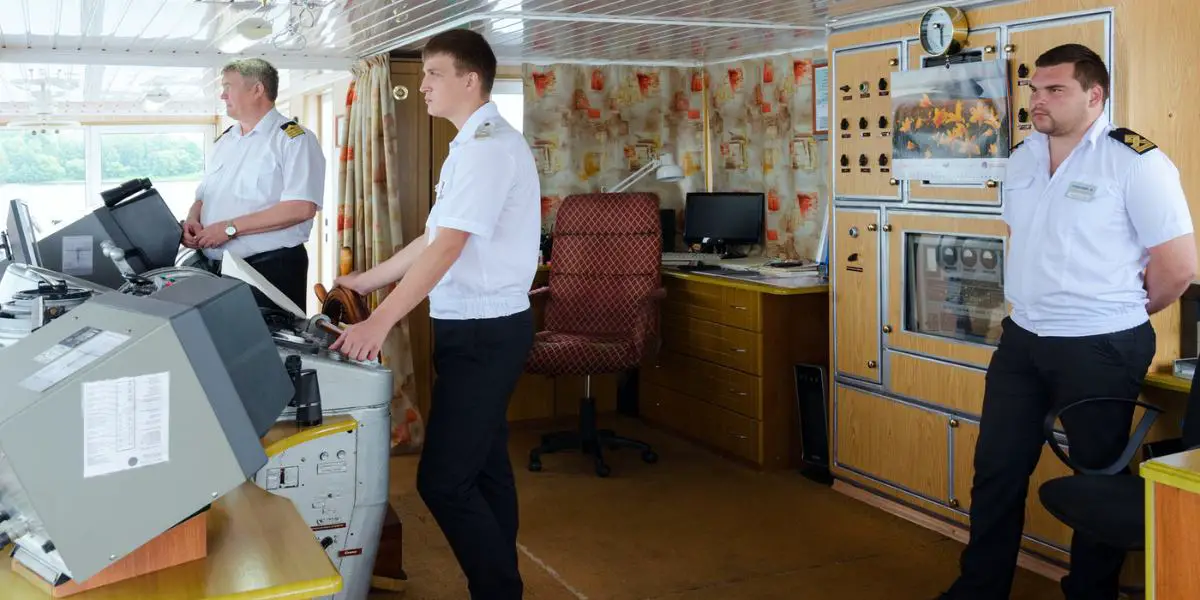
Safety of Passengers and Crew
It is also the responsibility of the captain to make sure that the ship is compliant with all maritime regulations.
The safety of the passengers and crew is the responsibility of the captain and in the event of an accident should be the last person to leave the ship, putting the safety of all passengers and crew before themselves.
Oversea Ship Maintenance and Operations
The cruise ship captain is in charge of overseeing the seaworthiness of the ship, ensuring correct maintenance and engineering operations of the vessel are upheld to the highest standards while at sea.
This includes making sure that all safety equipment is in good working order and that the crew is properly trained in its use.
The captain will also be responsible for inspecting or reviewing reports from heads of relevant departments of the ship on a regular basis to ensure that it is seaworthy and fit for purpose.
In addition to this, the captain will also be responsible for managing the ship’s paperwork and certificates.
Local and International Customs and Immigration Laws
The captain of a cruise ship is responsible for making sure that the ship complies with all local and international customs and immigration laws.
This includes making sure that all passengers have the correct documentation to travel to their destination and that they are adhering to the customs regulations of each country that the ship visits.
The captain will also need to make sure that the ship has the correct documents and certificates to dock at each port.
The captain may not deal with these issues first-hand, but it’s their responsibility to ensure the crew in the relevant departments are adhering to the rules and regulations as required.
Cruise Ship Security
The captain is responsible for making sure that the ship is secure at all times and that there are adequate security measures in place to protect the passengers and crew from any potential threats.
This includes ensuring that there are security personnel on board as well as CCTV systems and other security measures.
In addition to this, the captain will also need to make sure that the ship is compliant with the International Ship and Port Security Code (ISPS) an international maritime security measure that was introduced in response to the terrorist attacks of September 11, 2001.
There are many possible security issues a ship could encounter including piracy, stowaways, and terrorist threats.
It is the responsibility of the captain to make sure that the ship is prepared for any eventuality.
The captain of a cruise ship may also be responsible for dealing with unruly or even criminal activities and felons which may have to result in a passenger being imprisoned in the cruise ship jail or brig as they are otherwise known.
As well as possibly making decisions as to whether a passenger should be kicked off the ship.
Dealing with Emergencies
The captain of a cruise ship is responsible for dealing with any emergency situations that may arise during the voyage.
This includes anything from medical emergencies to fires on board the ship.
The captain would also oversee any incidents such as death on the cruise and the use of the onboard morgue .
In the event of an emergency, the captain will need to make sure that the correct procedures are followed and that the safety of all passengers and crew is paramount.
The captain may not deal with the emergency directly, but they will be responsible for coordinating the response and giving orders as necessary.
Managing the Crew
The captain of a cruise ship is responsible for managing the crew and making sure that they are adhering to the rules and regulations of the ship.
The cruise ship captain is the head of ship with a number of heads of departments and officers having to report or communicate issues to the ship captain.
These include but are not limited to:
- Staff Captain
- Safety Officer
- Environmental Compliance Officer
- 1st Navigation Officer
- Chief Security Officer
The captain will also need to deal with any disciplinary issues that may arise amongst the crew.
Attend Onboard Social Events
The captain of a cruise ship is usually required to attend various social events that are held on board the ship.
This includes things like cocktail parties, dinners, and balls.
The captain may also be required to give speeches at these events.
While attending these social events is not strictly part of the job, it is considered to be good practice as it helps to foster good relations with the passengers.
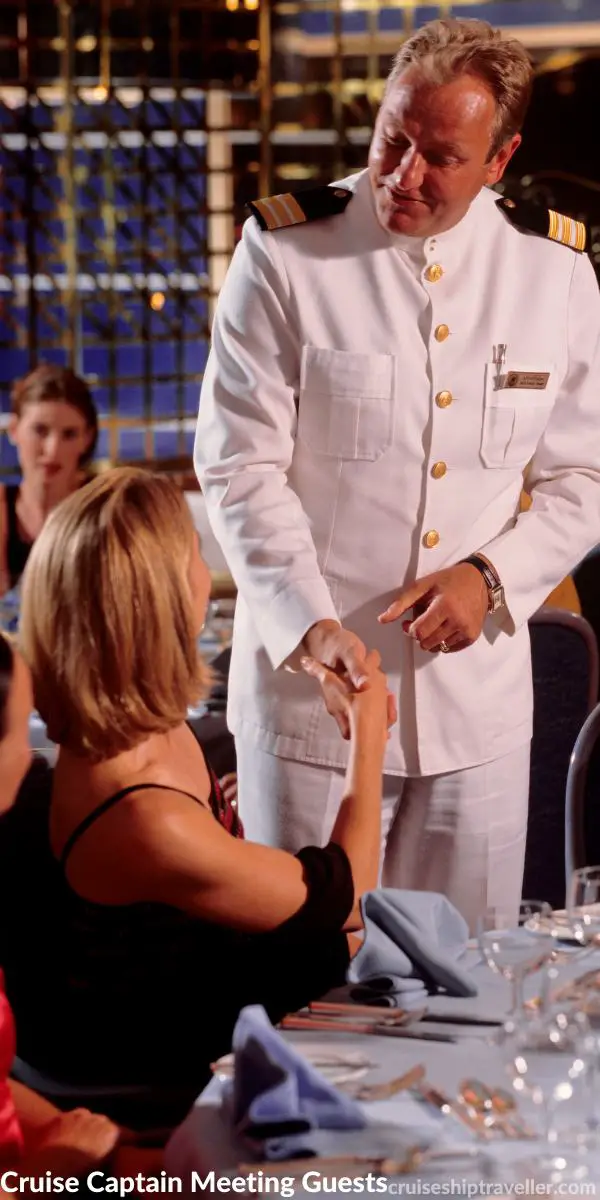
Marrying Couples
One of the more unusual duties of a cruise ship captain is to officiate at weddings that are held on board the ship.
This is often seen as a romantic gesture and many couples choose to get married on a cruise ship because of this.
However, it is important to note that not all captains are legally able to perform marriages.
Work Schedule On Call 24/7
Another factor to bear in mind is that the captain of a cruise ship is on call 24 hours a day, 7 days a week.
This means they may be called upon at any time to deal with an emergency or problem.
While there are usually other officers who can take over in the event of an emergency, the captain is still responsible for the ship and its passengers.
Cruise captains tend to work in rotation, working 8 to 10 weeks on the ship followed by 8 to 10 weeks off-ship all covered by the salary.
How to Become a Cruise Ship Captain
To become a cruise captain, you will need a master’s degree in maritime studies and 10 to 15 years of experience working in various positions on ocean vessels.
Captains will need to have passed the Federal Maritime Authority captain’s license exam once they have 10 years of experience.
Some of the skills that are required for this job include:
- Top-level people skills
- Strong leadership
- Good communication
Captains also need to be able to maintain their composure and act decisively in an emergency.
Does a Cruise Captain Have to Go Down With the Ship?
In the event of a disaster, it is the captain’s obligation and legal duty to be the last man off the ship. The captain should stay on board for as long as possible ensuring that all passengers and crew are evacuated safely in the event of such an emergency.
One recent well-known case was that of the Costa Concordia in 2013. In this instance, captain Francesco Schettino left the ship while passengers and crew members were still on board and ended up being one of the first to reach dry land.
He was sentenced to 16 years imprisonment, of which one year was attributed to his actions of abandoning passengers.
Thankfully these kinds of disasters are extremely rare events and the vast majority of cruise captains are worthy of their important and well-paid role on the ship.

How Many Captains are on a Cruise Ship?
There is only ever one captain at a time on a cruise ship. The captain usually takes the position for a set period of time, anywhere from 8 weeks to 12 weeks. Although it varies depending on the cruise line.
Often there will be two captains rotating work contracts on the ship. While one is on vacation, the other captain takes over.
Often a captain is on the ship for a few years at a time, usually with an eye to moving up to a bigger ship in the fleet should the opportunity arise.
Frequently Asked Questions
What is the highest paid cruise captain.
According to Payscale the highest pay for a ship captain is US$190,000 annual salary. In reality, this could be over $200,000 in some cases.
What is a Mega Cruise Ship Captain Salary?
We would expect captains of some of the world’s largest mega-cruise ships to be paid the highest annual salaries in the range of $170,000 to $200,000. A Captain of a mega cruise ship will have many of years experience.
Cruise lines with mega cruise ships:
- Royal Caribbean
- Costa Cruises
- P&O (their largest ship Iona)
- Carnival cruises
- MSC Cruises
- Norwegian Cruises
- Princess Cruises
Many of which have cruise ships with the capacity to carry over 5000 passengers.
How Much Does a Disney Cruise Captain Make a Year?
Disney cruise ships are captained by some of the most experienced and veteran captains in the business. It is not known exactly how much they earn, but we would expect them to be amongst the highest paid with an annual salary in excess of $150,000.
What is a Royal Caribbean Captain Salary?
A Royal Caribbean Cruise ship captain salary is not publicly known or shared, but we would expect the captain of one the world’s largest cruise ships to be one of the highest-paid with an annual salary possibly excess of $190,000 to $200,000 a year.
These would be captains of Royal Caribbean largest ships:
- Wonder of the Seas
- Symphony of the Seas
- Harmony of the Seas
- Oasis of the Seas
- Allure of the Seas
- Icon of the Seas
Captains of smaller ships in the fleet would be expected to earn less, but most probably above the average at a higher rate of 120,000 to $150,000+ annual salary
What is a Carnival Cruise Captain Salary?
A Carnival Cruise captain salary has not been publicly shared, as most individuals prefer to keep their salaries private.
With a fleet of at least 24 ships, the salaries would vary, depending on various factors, one of which being the size of the ship. Some of the larger Carnival Cruises ships are twice the size and have double the capacity of smaller ships in the fleet.
Can Women Be Cruise Captains?
Females can become cruise ship captains, although the numbers are very low. In fact, there are only a handful of female captains working for the major cruise companies.
The most notable is Captain Kate McCue of Celebrity Edge. She is the first American woman to be appointed captain of a mega cruise ship.
What is Captain Kate McCue Salary?
Captain Kate McCue salary would be in the region of $150,000 to $190,000 a year. Celebrity Cruises are a premium cruise line with luxury modern cruise ships. As a captain of Celebrity Beyond, a luxury Edge class cruise ship it would be expected that Kate McCue would be one of the highest paid cruise ship captain.
As the most public well-known cruise ship captain, she no doubt earns extra from her large social media following.
The role of the cruise ship captain is a highly responsible and demanding one, with many different duties and responsibilities including the safety of the ship, its crew, and passengers.
Related Posts
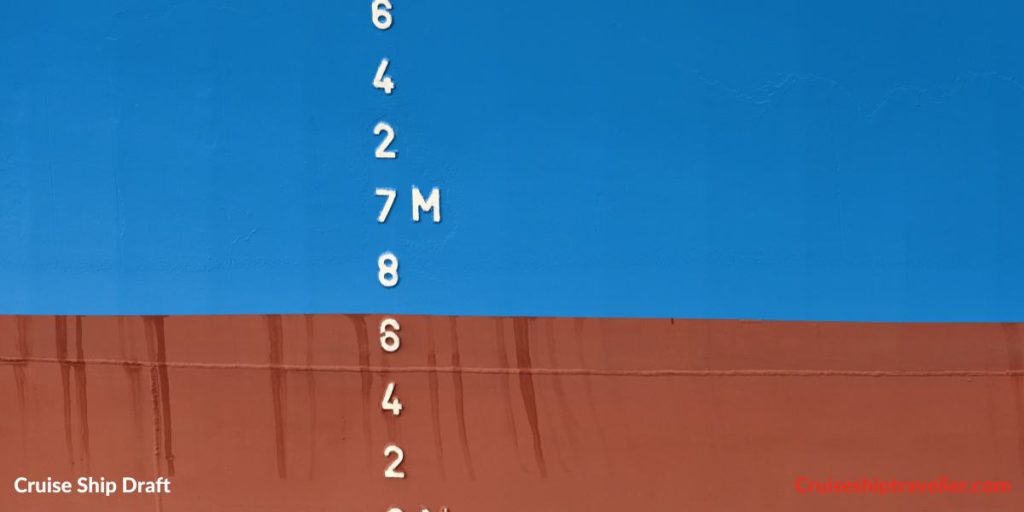
What is the Draft of a Cruise Ship? (and Why Does it Matter?)

How Many Doors on a Cruise Ship? (Yes, I Counted)
Leave a comment cancel reply.
Your email address will not be published. Required fields are marked *
Save my name, email, and website in this browser for the next time I comment.

World’s Coolest Travel Jobs: What It’s Like to Be a Cruise Ship Captain
We chat with the first american female captain of a megaship and learn how she started out, what it’s like to live on a cruise ship, and the most interesting day she’s ever had at sea..
- Copy Link copied

The “Celebrity Equinox” travels to Puerto Rico, St. Maarten, St. Thomas, the Dominican Republic, and the Bahamas.
Courtesy of Pixabay
In this series, we explore what it takes to land—and work—the world’s coolest travel jobs. Previous installments featured interviews with a hotel uniform designer , a social media influencer , and a traveling magician . Up next: a cruise ship captain.
Kate McCue was 12 years old when she took her first cruise. It was a four-day family vacation in the Bahamas on the Premier Cruise Line’s Atlantic . She discovered a schematic of the ship on board and was totally enchanted. She told her dad she wanted to be a cruise director when she grew up, and he told her she could do anything she wanted—including drive the thing. McCue went on to attend California Maritime Academy and worked for Royal Caribbean International for 12 years. At age 37, she became the first American woman to captain a megaship. In April, McCue picked up a new captaining gig on Celebrity Cruises’ Celebrity Equinox , a 2,850-passenger ship traveling to Puerto Rico, St. Maarten, St. Thomas, the Dominican Republic, and the Bahamas. We caught up with McCue to ask about her biggest career break in the cruise industry, the hidden perks of ship life, and the secret to a happy intercontinental marriage.
You just left Bar Harbor, Maine, and now you’re headed to Québec, which means I just called you in the middle of the ocean. How far in advance do you get your sailing schedule?
“Captains are assigned to a ship for about two years, then we’re up for rotation. This is so we can go through the fleet, sail on different vessels, and have different experiences. We know where the ship is going at least a year in advance, and our contracts are three months on board as captains and then three months of free time at home.”

Captain Kate McCue helms Celebrity Cruises’ “Celebrity Equinox,” a 2,850-passenger ship.
Courtesy of Celebrity Cruises
What do you do in your three months off? “I’m still trying to figure it out! When you’re working on the ship, you’re on 24/7. It doesn’t matter if it’s 2 in the morning, cruise ship staff members have to be available at every single moment. That’s why crew members get the vacation time we do. When I’m off the ship, it’s a little rough settling back into life on land. Things like making the bed, cooking the food, doing the dishes, and even making the coffee are taken care of for me on board. Fortunately, my husband does all the cooking at home—and the dishes, too.”
Let’s rewind the clock. What was your experience like at California Maritime Academy? Was the school fairly male-dominated at the time?
“Oh, yes. My graduating class had 68 people and only eight of us were female. I felt a little duped because my dad always wanted to go to sea. He entered the Peace Corps and when he came back, he applied to Cal Maritime but was told he was too old to attend. It always stayed in the back of his brain, so when it was time for me to choose a college, he suggested Cal Maritime. He told me I’d get to go on a cruise every year, but what he actually meant was that I’d stand on deck in the pouring rain, learning how to chip and paint. [ Laughs ] That said, it was the best four years of my life. Everybody looked after each other, which set the groundwork for how it feels when you work on a cruise ship. Celebrity Summit, for example, has 66 different nationalities on board. We’re all a minority of some sort—whether it’s race, religion, cultural background, or sexual orientation—but the crew is one big family.”
What kind of jobs do you do on ships when you’re first starting out?
“When you first start out, your kind of a gofer. You’re on watch with an officer on watch, who teaches you how to put positions down, how to stand and watch, how to paint, and how to do the maintenance of the deck. My second year, I stood watch with a fully licensed officer on a banana boat that went from Ecuador to Long Beach. I assisted on the bridge and learned how port operations worked, from loading the bananas to securing the cargo holds. The third year I went to sea, I was the officer in charge of a watch—standing on the bridge, doing the navigating and the positions and the safety equipment checks, everything.”
“I completely geek out when wildlife comes around—if it’s dolphins or whales, I’m the one screaming from the top of the deck!”
When you say “standing watch,” what are you watching for?
“Anything. Nowadays we have electronics that help us steer the ship, but since the captain can’t be up there 24 hours a day, the officer on watch makes sure all the navigation equipment is working and that we’re on track for where we are intending to go. If we receive a distress message, we monitor the radios to make sure communication is received and assistance is rendered. I like to look out for whales, too. I completely geek out when wildlife comes around—if it’s dolphins or whales, I’m the one screaming from the top of the deck!”
Looking at your career to date, what do you consider your first big break?
“When I joined Royal Caribbean, I came in as a second officer and worked with a female first officer. After my first contract ended, she wrote this amazing letter to the captain recommending me for a promotion. The captain took it to heart and I was promoted to first officer for my next contract. That was a big break. And then, of course, when I got promoted to the captain position—that’s the biggest break of all!”
Tell me about it. Did you know it was coming?
“I had no idea! I was actually asleep when my husband woke me up and said there was an email from Celebrity, the sister brand of Royal Caribbean. The letter was so incredible. It came before Father’s Day, so I asked if I could tell my mom and dad before the promotion was announced publicly. I printed out the letter and gave it to my dad for Father’s Day. When he got to the part about the promotion, he looked up at me, he looked down at the letter, he looked back up at me, and then he just started sobbing! ‘ Captain?!’ When you work hard for 19 years and it pays off, it’s like an out-of-body experience.”
What are the personality characteristics of a great captain?
“The navigation, the maneuverability of the ship—those are things you can learn. But you have to be able to listen to people and you have to be empathetic. Where a situation may seem black or white, you have to be able to see gray and find workarounds.”
Managing such a large and diverse team must be the hardest part of your job. You have the engineers in the boiler room, housekeepers, chefs, activity directors . . .
“I actually think the hardest part of the job is also the most exciting: Every day is different. Tomorrow we’re in a different place, with different people, and even different weather. Constant change keeps you on your toes. Three months sounds exhausting, but I find it exhilarating. And if I’m ever feeling tired, I’ll talk to our guests. I feed off their energy.”
It seems like it’d be impossible to be bored.
“Oh, yeah! ‘Bored’ is not a word we use on board the ship. [ Laughs ] Bored on board . . . nice one! But even when we’re in port, I love doing the city tours.”
Speaking of port stops, do you have any strategies for tackling a new destination in such a short window of time?
“I usually go through our shore excursions department and destination concierge. They know everything about every port: what to do, where to go, what to see. In Portland, Maine, for example, we went to the lighthouses, Kennebunkport, and downtown Portland. We got our lobster rolls and our fried clams. It was the whole Portland mashup in six hours!”
“Tomorrow we’re in a different place, with different people, and different weather. Constant change keeps you on your toes.”
What are your accommodations like on board? Have they changed a lot over the years?
“When I first started as a cadet on the training ship, we had 18 bunks in the same room and we all shared a bathroom. When I was working on the banana boat, I had my own cabin with a bed, a little workstation, and a bathroom. Now, as captain, I’ve got a bedroom, an office, a living room, a dining room, three bathrooms, a spare room, a laundry, and pantry . . . I’ve even got a toaster!”
When passengers see you in a restaurant or other public space, what do they ask you?
“How I got into this, how I got started. They want to know about challenges of working on a cruise ship. They also want to know about my husband: Where is he? What does he do? How often do you see each other? Do you have kids?”
Do you think guests ask about your husband because they’re trying to reconcile how you balance such a busy life at sea with a personal life at home?
“Yes. But times have changed. When I first started sailing, we were sending telex messages at $7 per word. Now I see my husband twice a day—once in the morning and once in the evening, thanks to Skype and Messenger. So the distance is still there, but the relationship doesn’t have to suffer. I like to think that the secret to a happy marriage is 12 time zones. It feels like a honeymoon when we finally go on vacation together!”
OK, last question and it’s an easy one: What’s one thing we’d be surprised to learn you pack?
“Uh, my cat?”
[ Laughs ] Other than the cat, which I grant you is unusual.
“Other than the cat and the cat’s wardrobe, my Louboutins go with me on every ship. I say that we should make ’em part of the official Celebrity uniform, but I’m not winning that battle.”
Captain Kate is on Instagram! Track her high-seas adventures by following @captainkatemccue .
>>Next: What It’s Really Like to Be a Social Media Influencer


Cruise Ship Captain Salaries in 2024: Everything You Need to Know!
Embark on a voyage through the life of a cruise ship captain, from their commanding captain salaries to the high seas of responsibility.
This guide unveils the earnings, challenges, and the path to steering the world’s most magnificent vessels, providing an in-depth look into a career that’s both demanding and rewarding.

The Path to Captaincy
Becoming a cruise ship captain is a dream for many, conjuring images of navigating vast oceans and exotic destinations.
Yet, the journey to the helm of a colossal vessel like the Icon of the Seas is paved with dedication, extensive training, and years of maritime experience.
In this section, we’ll chart the course to captaincy, exploring the educational requirements, experience needed, and the essential skills that make a successful captain.
Educational Requirements
A solid educational foundation is crucial for anyone aspiring to captain a cruise ship. Here’s what future captains need to focus on:
- Nautical Science or Marine Engineering Degree : Most cruise lines require a Bachelor’s degree in Nautical Science or Marine Engineering as a starting point. These programs cover navigation, ship technology, maritime law, and other critical subjects.
- Certifications and Licenses : Beyond a degree, captains must obtain professional certifications, such as the Standards of Training, Certification, and Watchkeeping (STCW), and a Master’s license issued by maritime authorities like the United States Coast Guard.
Gaining Experience
Climbing the ranks to captaincy involves accumulating years of maritime experience:
- Starting Positions : Many captains begin their careers in entry-level positions, such as deck officers, gradually working their way up through roles like third mate, second mate, and chief mate.
- Chief Officer Experience : Before earning the captain’s stripes, a significant tenure as a chief officer is essential. This role involves overseeing the deck crew and participating in navigation and ship safety, providing invaluable experience for the top job.
Key Skills for Success
A cruise ship captain’s role extends beyond navigation, requiring a blend of hard and soft skills:
- Leadership and Communication : Effective management of a large crew and ensuring passenger safety necessitates strong leadership and clear communication.
- Decision-Making Under Pressure : Captains must make swift, accurate decisions in emergencies or adverse weather conditions.
- Technical Proficiency : A deep understanding of the ship’s systems and the latest maritime technologies is crucial for safe and efficient voyage planning.
Navigating the Career Ladder
The path to becoming a cruise ship captain is both challenging and rewarding.
Aspiring captains must be prepared to invest in their education, commit to gaining extensive maritime experience, and develop the essential skills needed for leadership at sea.
With dedication and hard work, the captain’s hat is within reach, symbolizing the pinnacle of a maritime career.

Understanding Cruise Ship Captain Salaries
Embarking on a career as a cruise ship captain promises not only adventure and authority but also a lucrative financial reward.
The salary of a cruise ship captain is a topic of much interest and speculation, with figures ranging significantly based on various factors.
In this section, we dissect the components of a cruise ship captain’s salary, providing insight into what captains really earn and the elements that shape their compensation.
Salary Range and Influencing Factors
Cruise ship captains’ salaries can vary widely, from as low as $48,000 to upwards of $200,000 annually. This broad range is influenced by several key factors:
- Experience : Veterans of the sea command higher salaries. The top earners often have decades of maritime experience, reflecting the high level of trust and responsibility placed in their hands.
- Ship Size : The axiom “bigger ship, bigger paycheck” holds true in the maritime world. Captains of larger vessels, especially those carrying thousands of passengers, tend to have higher salaries due to the increased operational complexity and responsibility.
- Employer : The cruise line itself plays a significant role in determining salary. Luxury cruise lines may offer higher pay, reflecting the premium services and clientele they cater to.
- Geographical Location : Salaries can also be influenced by the ship’s operating regions. For example, captains in high-end European or North American markets might earn more than their counterparts cruising in other parts of the world.
Breaking Down the Paycheck
A closer look at a cruise ship captain’s paycheck reveals a base salary complemented by various bonuses and benefits, which can include:
- Performance Bonuses : Rewards for exceeding safety, efficiency, and customer satisfaction targets.
- Tenure Bonuses : Additional compensation for long-term service with a cruise line.
- Benefits Package : Health insurance, retirement plans, paid leave, and sometimes even educational allowances for family members.
Comparative Analysis
To put these salaries into perspective, it’s helpful to compare them with other high-paying maritime jobs.
For instance, chief engineers and hotel managers on cruise ships also command high salaries but generally fall slightly below the captain’s earnings.
The Bottom Line
A career as a cruise ship captain is undeniably financially rewarding, reflecting the significant responsibilities that come with the role.
However, reaching the pinnacle of this career path requires a combination of education, experience, and the development of key skills.
In the next sections, we’ll explore the daily responsibilities and challenges of a cruise ship captain, shedding light on why these positions are so well-compensated.

The Factors Influencing Cruise Ship Captain Salaries
The salary of a cruise ship captain is not a fixed number but fluctuates based on several crucial factors.
Understanding these elements is key to grasping the full picture of a captain’s compensation. Here, we dive into the primary influences on a captain’s salary, shedding light on the maritime industry’s pay structure.
Experience: The Sea’s Seniority Pay
- Entry-Level vs. Veteran Captains : The gap between newcomers and seasoned captains is significant. While a novice captain might start at the lower end of the salary spectrum, veterans can earn at the top, with figures reaching up to $190,000 annually or more.
- Milestones and Longevity : Salary increments are often tied to career milestones and longevity at sea. Each successful voyage, solved crisis, and demonstrated leadership ability can lead to salary increases.
Education and Training: Investing in Knowledge
- Maritime Degrees and Certifications : Higher education and specialized training can boost a captain’s earning potential. Degrees from prestigious maritime academies and advanced certifications are often rewarded with higher salaries.
- Continuous Learning : The maritime industry values continuous improvement. Captains who engage in ongoing training and stay updated with the latest navigational and safety standards may see this reflected in their compensation.
Ship Size and Type: Bigger Might Be Better
- Operational Complexity : The size and type of ship a captain commands greatly affect their salary. Larger ships, especially those with advanced technological systems and larger passenger capacities, require captains with higher levels of expertise and responsibility, leading to higher pay.
- Specialization : Captains specializing in certain types of cruises, such as luxury expeditions or unique destinations, might command higher salaries due to the niche expertise required.
Geographical Influence: Location Matters
- High-Demand Routes : Salaries can vary with the ship’s operational areas. Captains navigating high-demand routes or prestigious regions often earn more due to the higher revenue and prestige associated with these locations.
- Global Variations : The global maritime market also plays a role, with salaries differing significantly from one country to another based on local economies, living costs, and the demand for maritime professionals.
Navigating the Salary Seas
The journey to becoming a cruise ship captain involves not just navigating the oceans but also understanding the complexities of the industry’s salary structure.
Experience, education, the size and type of vessel, and geographical location all play pivotal roles in determining a captain’s earnings.
As we’ve seen, the path to commanding one of these floating cities is multifaceted, with each factor contributing to the ultimate reward: a lucrative salary that reflects the immense responsibility carried by cruise ship captains.

The Daily Life of a Cruise Ship Captain
The role of a cruise ship captain encompasses far more than navigating through tranquil seas and exotic locales.
It’s a position of vast responsibility, requiring a unique blend of leadership, technical prowess, and decision-making skills.
Here, we delve into the day-to-day realities and responsibilities of a cruise ship captain, revealing the multifaceted nature of this prestigious role.
Navigating the Ship
- Safe Passage : The captain’s primary duty is ensuring the vessel’s safe navigation. This involves meticulous planning of the ship’s course, constant monitoring of sea conditions, and making adjustments as necessary to avoid hazardous weather or obstacles.
- Technical Mastery : Commanding a modern cruise ship requires a deep understanding of sophisticated navigation systems, propulsion units, and safety mechanisms. The captain must be adept at using these technologies to guide the massive vessel safely.
Safety and Security
- Emergency Preparedness : The captain is the ultimate authority in handling emergencies, from medical situations to security threats. They oversee drills, ensure compliance with international safety regulations, and make critical decisions during actual emergencies.
- Security Oversight : In today’s world, security is a paramount concern. The captain works closely with security officers to implement measures against potential threats, including piracy and terrorism.
Crew Management
- Leadership Role : As the head of the ship’s crew, the captain sets the tone for the onboard working environment. They must inspire, guide, and manage a diverse team of professionals, ensuring everyone performs their duties effectively.
- Human Resources : While larger ships have dedicated HR departments, the captain is often involved in addressing crew concerns, mediating disputes, and fostering a positive work culture.
Operational Oversight
- Daily Operations : The captain oversees the smooth operation of all aspects of the ship, from engine performance to guest services. They coordinate with department heads, ensuring each segment of the ship’s operation meets the cruise line’s standards.
- Maintenance and Repairs : Regular maintenance is crucial for the safety and efficiency of the ship. The captain monitors the condition of the vessel, scheduling repairs and maintenance to avoid disruptions to the cruise experience.
Administrative Duties
- Paperwork and Documentation : A significant part of the captain’s job involves administrative work. This includes filling out logs, reporting to maritime authorities, and ensuring all operations comply with international laws and regulations.
- Port of Call Procedures : When arriving at or departing from ports, the captain handles the necessary legal and procedural documentation, liaising with local authorities to ensure smooth operations.
The Rewarding Challenge
The daily life of a cruise ship captain is a balancing act between leadership, technical skills, and administrative duties.
It’s a role that demands round-the-clock dedication and the ability to make decisive actions under pressure.
While the responsibilities are immense, the position offers unparalleled rewards, from the satisfaction of overseeing a vessel’s safe journey to the opportunities for global exploration.

The Perks That Come with the Captain’s Hat
While the role of a cruise ship captain is undoubtedly demanding, it comes with a suite of perks and privileges that make the challenging job highly rewarding.
Beyond the competitive salary, captains enjoy several benefits that enhance their quality of life at sea and contribute to the allure of this esteemed position.
Complimentary Meals and Accommodations
- Fine Dining : Captains have access to the ship’s array of dining options, enjoying complimentary meals that range from casual eateries to fine dining restaurants, reflecting the diverse culinary experiences available to passengers.
- Luxurious Living Quarters : The captain’s cabin is far from ordinary, offering spacious and comfortable accommodations that often include separate living areas, private balconies, and premium amenities, ensuring a restful haven away from the demands of command.
Access to Exclusive Events and Facilities
- Social Engagements : Captains are often the guests of honor at onboard events, including cocktail parties, captain’s dinners, and special receptions. These occasions provide an opportunity to mingle with passengers, share maritime tales, and enhance the cruise experience for everyone on board.
- Recreational Amenities : When off-duty, captains can enjoy the ship’s leisure facilities, from fitness centers and spas to pools and entertainment venues, offering relaxation and enjoyment amidst their busy schedules.
Travel Opportunities
- Global Exploration : One of the most enviable perks of being a cruise ship captain is the opportunity to visit breathtaking destinations around the world. From tropical paradises to historic ports, captains experience the rich tapestry of global cultures and landscapes firsthand.
- Family Travel Benefits : Some cruise lines extend travel benefits to the captains’ families, allowing them to join voyages and share in the adventure of sea travel, making it a unique perk of the profession.
Professional Growth and Networking
- Leadership and Management Experience : The role of a captain hones leadership and management skills that are highly valued, opening doors to further career advancement within the maritime industry or beyond.
- Industry Networking : Through attending exclusive events and interacting with a wide range of professionals, captains build a network of contacts that can offer new opportunities and insights into the maritime sector.
A Lifestyle Like No Other
The perks of being a cruise ship captain contribute to a lifestyle that is both rewarding and enriching, offering a blend of luxury, adventure, and professional fulfillment.
These benefits, coupled with the sense of accomplishment that comes from leading a large crew and ensuring the safety and satisfaction of thousands of passengers, underscore the unique appeal of the captaincy.

The Reality of Being a Captain – Is The Salary of a Cruise Ship Captain Worth It?
Becoming a cruise ship captain is often seen as reaching the pinnacle of the maritime profession, a role replete with respect, authority, and the allure of the high seas.
However, behind the prestigious title and the enviable perks lies a reality filled with challenges and sacrifices.
This section delves into the demanding aspects of a captain’s life, offering a balanced view of the profession to those considering this career path.
Demanding Work Schedule
- Around-the-Clock Responsibility : Captains are on duty 24/7, with the well-being of passengers and crew always on their minds. The job doesn’t stop when the ship docks; there are always operational matters that require the captain’s attention.
- Extended Time at Sea : Months away from home is a common reality for cruise ship captains, leading to missed family events, holidays, and significant milestones in the lives of loved ones.
High Levels of Responsibility
- Safety is Paramount : The captain bears the ultimate responsibility for the safety of everyone on board, a weighty burden that requires constant vigilance and readiness to respond to any emergency.
- Operational Oversight : Ensuring the smooth operation of the ship’s myriad systems, from navigation to guest services, adds layers of complexity to the captain’s role.
Stress and Decision-Making Pressure
- Critical Decisions : In emergencies, the captain must make split-second decisions with potentially life-altering consequences. The stress of such situations can be immense, demanding a cool head and a steady hand.
- Public Relations : As the face of the ship, captains also handle interactions with passengers, addressing concerns and managing expectations, which can be challenging in its own right.
The Rewards: A Counterbalance
Despite these challenges, many captains find the rewards of their profession to outweigh the sacrifices. The respect and admiration from crew and passengers, the joy of navigating the world’s oceans, and the satisfaction of leading a complex floating community provide a sense of fulfillment that is hard to match.
Is It Worth It?
For those with a deep love of the sea and a passion for leadership, the answer is often a resounding yes. The salary and benefits package, while reflective of the role’s demands, is only part of the equation.
The true worth of being a cruise ship captain lies in the personal satisfaction of a job well done, the adventure of travel, and the pride in overseeing the safety and happiness of a ship’s passengers and crew.

How Much Do Cruise Ship Captains Make Working for Luxury and Popular Cruise Lines
The allure of the sea, combined with the leadership role of a cruise ship captain, offers not just a unique career but also a diverse range of financial rewards, particularly when comparing salaries across luxury and popular cruise lines.
This section navigates through the earnings landscape, highlighting how working for different cruise lines can impact a captain’s salary and benefits.
Luxury Cruise Lines: A Premium on Experience
Captains employed by luxury cruise lines often enjoy higher salaries, reflective of the premium service and experience these lines offer their clientele.
The exclusivity and smaller size of luxury ships demand a higher level of personalized service, often translating into greater compensation for captains.
- Average Salary : On luxury lines, a captain’s salary can average around $150,000 per year, though this figure can exceed $200,000 for those with extensive experience and tenure.
- Additional Perks : Beyond the base salary, luxury lines often provide enhanced benefit packages, including longer vacation times, superior accommodations, and exclusive access to ship amenities and services.
Popular Cruise Lines: Competitive Compensation
While not always reaching the high-end salary marks of their luxury counterparts, popular cruise lines still offer competitive compensation packages to attract skilled captains.
These lines operate larger vessels, carrying thousands of passengers, and require captains to manage a more complex set of operations and a larger crew.
- Royal Caribbean and Celebrity Cruises : Examples of popular lines where captains can earn an average salary of $150,000 to $153,379 annually, along with comprehensive benefits such as health insurance, retirement plans, and family travel privileges.
Comparing the Earnings
The distinction between luxury and popular cruise lines in terms of captain salaries often lies in the scale of operations and the level of service:
- Scale of Operations : Larger ships require captains to oversee a more significant number of crew and passengers, manage more complex entertainment and safety systems, and handle more extensive administrative duties.
- Service Level : Luxury lines, with their focus on high-quality, personalized experiences, may demand captains who can contribute to this premium service ethos, justifying higher salaries.
Working for different types of cruise lines can significantly influence a captain’s earnings and benefits. Luxury cruise lines tend to offer higher salaries and more exclusive perks, reflecting the premium nature of the service they provide.
In contrast, popular cruise lines offer competitive salaries with substantial benefits, catering to a broader audience and operating on a larger scale.

Cruise Ship vs. Private Yacht Captain Salaries
Cruise ship captain salaries.
As previously discussed, the salary of a cruise ship captain varies widely based on factors such as experience, the size of the ship, and the employing cruise line. Here’s a recap:
- Salary Range : Cruise ship captains can earn between $48,000 to over $200,000 annually, with the average salary hovering around $96,000 to $153,379 per year.
- Influencing Factors : Experience, ship size, and the cruise line’s prestige play significant roles in determining salary. Captains of larger ships and luxury lines tend to earn at the higher end of the spectrum.
- Additional Benefits : Beyond their base salary, cruise ship captains often enjoy benefits like free accommodation, meals, health insurance, and travel opportunities.
Personal Yacht Captain Salaries
The salary of a personal yacht captain differs notably from that of a cruise ship captain, influenced by the size of the yacht, the owner’s wealth, and the complexity of the voyages undertaken.
- Salary Range : Salaries can range from $60,000 to well over $200,000 annually for captains of large, high-end luxury yachts.
- Influencing Factors : The yacht’s size is a primary determinant—captains of larger yachts (100 feet or more) command higher salaries. Additionally, the operational demands, such as the frequency of voyages and the need for specialized skills (e.g., scuba diving or water sports expertise), can affect earnings.
- Additional Benefits : Yacht captains may receive bonuses, health insurance, and other perks. Unlike cruise ship captains, personal yacht captains often have more flexibility in their schedules but might not have the same level of job security and structured career progression.
Key Differences
- Operational Scope : Cruise ship captains oversee the operation of massive vessels with thousands of passengers and crew members, requiring a broad skill set in large-scale hospitality management, safety, and navigation. In contrast, yacht captains manage smaller crews and are responsible for the personalized experience of a select group of individuals or a single owner.
- Personal Interaction : Yacht captains may have more direct interaction with their passengers (the yacht owners and their guests), requiring a different set of interpersonal skills compared to cruise ship captains, who interact with passengers more formally and less frequently.
- Lifestyle and Flexibility : Yacht captains often cater to the specific needs and schedules of the yacht owners, leading to a more unpredictable lifestyle but potentially more personal downtime when not on charter or in use.
While both cruise ship and personal yacht captains enjoy lucrative careers, the context of their roles greatly influences their compensation and benefits.
Cruise ship captains benefit from a structured career path with significant responsibilities and perks related to large-scale operations. In contrast, yacht captains often enjoy closer relationships with their charges and potentially more flexibility, albeit with salaries and job security that can vary widely based on the yacht and its owner.
Each career path offers unique rewards and challenges, tailored to different preferences and skill sets within the maritime profession.
Frequently Asked Questions – How Much Does a Cruise Ship Captain Make
In this section, we’ll address some of the most commonly asked questions regarding the salaries of cruise ship captains, providing insights into this intriguing and prestigious career.
What is the salary range for cruise ship captains?
The salary range for cruise ship captains can vary widely, typically ranging from $48,000 to over $200,000 annually. Factors such as experience, ship size, and the cruise line significantly influence where within this range a captain’s salary might fall.
How much do cruise ship captains earn annually?
On average, a cruise ship captain earns between $96,000 and $153,379 per year. Captains at the higher end of the salary range typically have extensive experience and command the largest vessels for luxury cruise lines.
What is the average monthly income of a cruise ship captain?
Based on the annual salary range, the average monthly income of a cruise ship captain can be roughly estimated at $8,000 to $12,780. This figure can fluctuate based on the specific terms of employment, bonuses, and additional benefits.
Who are the highest-paid employees on a cruise ship?
Aside from the captain, other high-paid employees on a cruise ship include senior officers such as the chief engineer, who is responsible for the ship’s mechanical systems, and the hotel director, who oversees guest accommodations and onboard services. The cruise director, responsible for entertainment and activities, also ranks among the higher-paid positions.
What factors affect a cruise ship captain’s salary?
Several factors affect a cruise ship captain’s salary, including:
- Experience : More experienced captains typically earn higher salaries.
- Ship Size : Larger ships require more expertise and responsibility, leading to higher pay.
- Cruise Line : Luxury and larger cruise lines tend to offer higher salaries.
- Geographical Location : Salaries can vary based on the cruise line’s operating regions and the cost of living in those areas.
Do cruise ship captains receive additional benefits besides their salary?
Yes, cruise ship captains often receive a comprehensive benefits package that includes health insurance, retirement plans, paid time off, and sometimes even educational benefits for family members. They also enjoy perks like free meals and accommodations, access to ship facilities, and travel opportunities.

The Real Salary of a Cruise Ship Captain
August 7, 2024
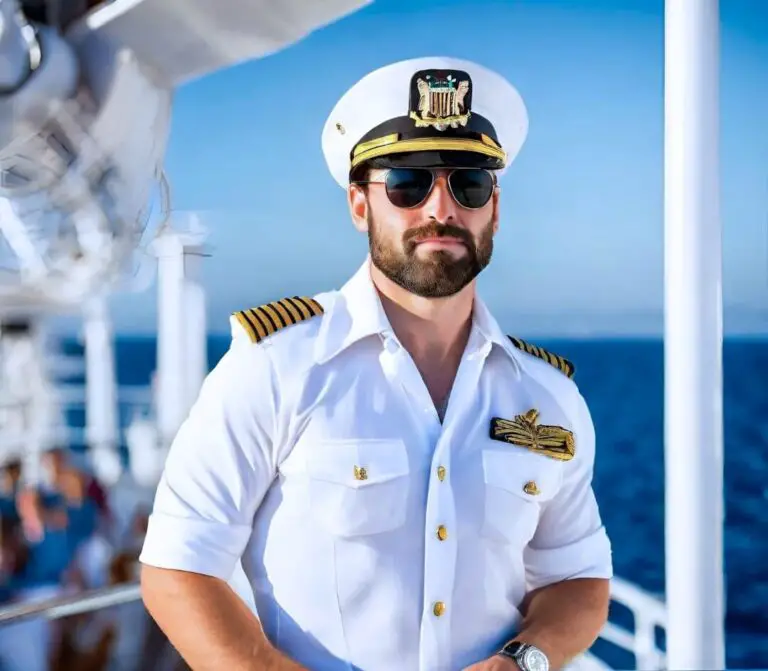
As you can imagine, captains are the most important person on a cruise ship. Of course, they are in charge of the ship but have many other duties and responsibilities .
Because of that, their salary can be quite high .
In this article, we will look at how much they get paid per month , and how the salary can change based on different cruise lines and locations .
Cruise Captain job
Cruise ship navigation.
Nowadays, captains rely on a high number of sophisticated navigational tools , from GPS systems and radars to electronic charts that track the ship’s precise positioning and course.
Even though the technological tools help navigate the ship, the captain’s judgment remains essential .
The captain must interpret weather patterns, ocean currents, and other vessels’ movements to make real-time decisions that balance efficiency with safety .
As you can imagine, cruise ship navigation is an intricate job that always requires the presence of someone at the command deck .
When the captain is busy with another task or is not on duty, there’s always a First Officer or Second Officer in charge .
Safety and security of all passengers
Above all, a cruise captain is the guardian of lives . The safety and security of passengers and crew are a priority that must influence every decision.
This responsibility includes a wide range of activities : overseeing the maintenance of life-saving equipment, conducting regular safety drills, implementing comprehensive security protocols against potential threats, and leading operations during emergencies.
Obviously, in case of emergencies, the captain’s leadership is crucial, and they must be experts in managing crises and difficult situations .
Crew management
On some cruise ships, the crew can be quite big and can exceed 2000 people .
The captain’s leadership style is crucial in developing an environment where diverse crew members , from various backgrounds and cultures, work harmoniously towards a common goal.
The captain, in particular, is responsible for the crew of the command bridge and the officers on the ship .
Attend social events

A unique aspect of a cruise captain’s role is their presence at social events, an opportunity to engage with passengers in a more relaxed setting .
As you may know, there are a few occasions when you can meet the captain during your cruise.
For example, the welcome aboard speech , the captain’s gala dinner , or the captain’s cocktail party . These events are often memorable and can add a personal touch to your vacation.
Captain’s salary
Let’s now talk about the salary.
Several factors can influence captains’ earnings . They range from individual qualifications and experience to external variables such as the size of the ship and the company’s prestige .
The experience stands as one of the most significant factors that can influence salary.
In the maritime world, every nautical mile enriches a captain’s expertise and seasoned captains can usually aspire to have higher salaries .
The experience can be related to navigational ability, but also the experience in crisis management and operational knowledge.
The size of the ship is another of the main factors that influence a captain’s compensation.
Larger ships require a captain with a higher level of navigational skill and technical knowledge.
They also entail greater responsibility in terms of safety, crew management, and passenger satisfaction.
We have seen in the ranking of Carnival cruise ships by size , how modern ships can have more than 6.000 passengers on board . Consequently, the compensation reflects the increased complexity and demands.
The company employing the captain plays a crucial role in determining salary levels.
Prestigious cruise lines , known for their expansive fleets and luxurious cruises, often offer higher compensation to attract and retain the most skilled captains .
These companies usually recognize that the captain’s expertise and leadership directly impact the passengers’ satisfaction and safety .
Furthermore, company-specific factors such as financial health and operational regions can all influence the salary.
While practical experience at sea is invaluable, formal education also plays an important role in shaping a captain’s salary.
Captains with advanced maritime degrees or certifications from recognized maritime academies or universities may have an edge in salary negotiations.
Usually, a degree is not necessary to become a cruise ship captain, but it still is an industry where regulations and technologies are constantly evolving.
Consequently, education ensures that captains remain updated on the new maritime safety, navigation, and management practices.
Lastly, where a captain is employed can significantly affect their salary.
Factors such as the cost of living , local demand for maritime professionals, and the economic conditions of the region all play a role.
For instance, captains working in regions with a high concentration of cruise operations, or in countries with strong maritime industries may have higher salaries.
Down below, we will look at the salaries for some specific regions such as the US, the UK, and Europe.
Captain’s salary by cruise line
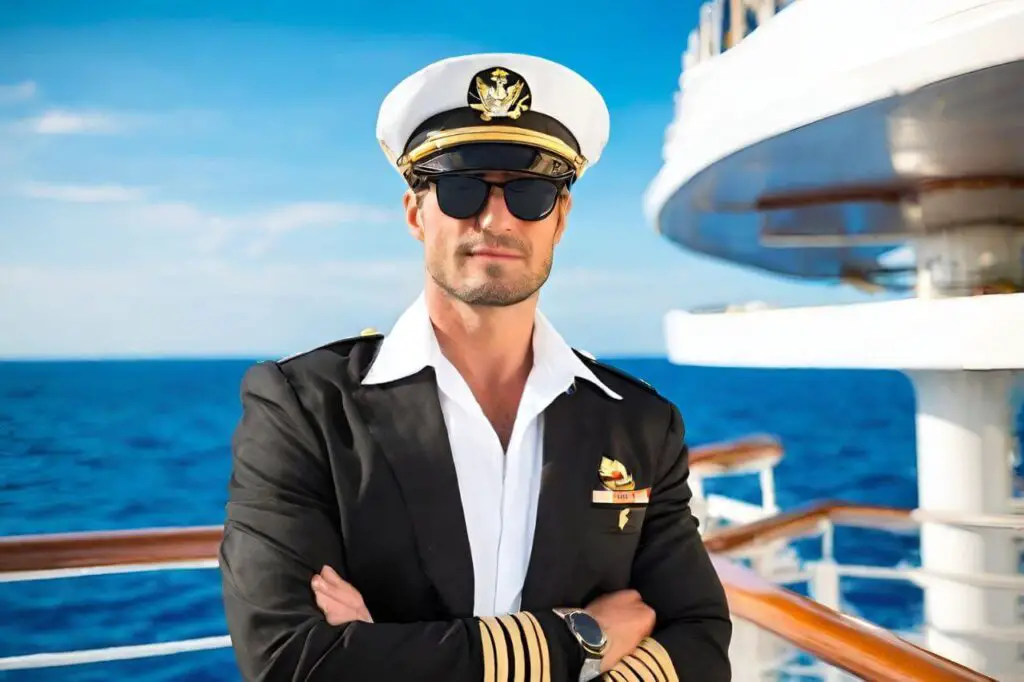
As we said before, the salary of a cruise ship captain varies significantly based on several factors, including the cruise line they work for .
Captains working for major cruise lines such as Carnival, Royal Caribbean, and MSC are very well compensated .
In addition to a competitive salary, cruise ship captains often have several perks, including suite accommodations, free flights, paid holidays, and health plans.
Cruise captain salary for Carnival Corporation
Carnival Corporation is the biggest cruise operator in the market with over ninety vessels across nine cruise lines.
As you can imagine, since they’re so big, their captain’s salary can vary a lot based on many factors.
To make an estimate, we can say that the range for a captain’s salary is typically between $60,000 to $160,000 annually .
Cruise captain salary for Royal Caribbean
Royal Caribbean offers a competitive salary range for their captains as well, with figures generally falling between approximately $120,000 to $180,000 or more per year.
This variation accounts for the diverse fleet and operational demands specific to Royal Caribbean’s global cruising operations.
Cruise captain salary for MSC
MSC Cruises is a cruise company that has grown a lot in recent years and their salary range is now competitive with other major cruise lines.
According to our information, MSC’s Captains can make approximately $80,000 to $160,000 . The range can vary significantly based on the size of the ship and the years of experience.
Captain salary based on location
Captain salary in the us.
Among other factors, the salary of a cruise ship captain varies significantly based on their location.
In the United States , the average salary for a cruise ship captain is approximately $94,000 per year , with variations depending on the city and state. Cities in California, such as San Jose and Santa Clara, offer the highest salaries, reaching an average of $120,000 per year .
Captain salary in the UK and Europe (Germany, Italy, France, Spain)
In Europe, captains can have a very good salary if their company operates in the richest European countries like the UK, Germany, Italy, France, and Spain.
According to Check a Salary , a cruise Captain in the UK has an average Salary of £108,000 with a max that can reach £140,000.
On the other hand, according to Salary Expert , the average for other European countries like Germany is €80,000 but with big swings based on the size of the ship and the experience of the captain.
Captain salary in India
In other parts of the world such as in Asia or South America, the salary of a captain is definitely lower.
For example, the salaries in India do not reach the levels seen in North America and Europe. The mean salary is more or less of INR 1,800,000 which is like 20,000 dollars.

Get my beloved cruise-specific packing list for free!
You will also receive special offers and cruise news!
Check your e-mail. If you can't find it look in the spam box!
Leave a Comment Cancel reply
Save my name, email, and website in this browser for the next time I comment.
What is a Typical Cruise Ship Captain Salary?
Disclosure: This post may contain affiliate links. We may receive compensation when you purchase via my links at no cost to you. See my disclosure for more information.
Cruise ship captains are responsible for the entire operation of a cruise ship. Their role is demanding, requiring years of experience, special skills, and long hours.
A cruise ship captain’s salary is $98,000. A captain’s salary depends on the vessel size, years of experience, and cruise line.
Cruise ship captains also receive benefits such as their cabin accommodations, food, flights, drinks, housekeeping, and more.
Keep reading to learn more about how much money cruise ship captains make.
Table of Contents
What is a Cruise Ship Captain Salary?

An average cruise ship captain’s salary is $95,000 , in a salary range of $50,000 to $190,000 . New cruise ship captains may start at $50,000, while more experienced captains can make over $150,000.
The exact salary for a cruise captain depends on the captain’s experience, education, the cruise line they work for, and the size of the ship they sail.
There is a wide range of estimates on cruise ship captains’ salaries. Below are some estimates for cruise ship captain’s salary:
- Comparably estimates the average cruise ship captain’s salary at $93,328 annually.
- Payscale estimates a ship captain’s average salary at $94,484 per year.
- Indeed.com estimates a cruise ship captain’s annual salary of $47,491.
The captain is the highest-paid crew member on a cruise ship. That’s because cruise ship captains have a demanding job that requires them to be on call 24/7.

A captain is responsible for the entire operation of the cruise ship. Not to mention, the captain is responsible for the thousands of lives on the vessel and the cruise ship’s safety.
The ship’s captain’s responsibilities include:
- Ship navigation
- Engine room operations
- Equipment maintenance
- Crew training
- Guest Services
- Ship entertainment
- Responding to emergencies
- Social events
- Ensuring the safety of guests, crew members, and the vessel
The size of the cruise ship is a significant contributor to a captain’s salary. Captains of mega cruise ships earn more than those piloting small luxury vessels.
Not all cruise lines pay the same, either.
Generally, the largest cruise lines, like Royal Caribbean, NCL, and Carnival, pay captains a higher salary than smaller cruise ship operators.
Cruise ship captains work on contract. A typical contract sees captains work for two months on the ship and take two months off between deployments.
Factors Affecting The Salary of a Cruise Ship Captain

Becoming a captain in the cruise industry requires a lifetime of hard work, training, and dedication.
I asked our captain how he became a cruise ship captain when we sailed on Serenade of the Seas . He first began working on ships at the age of 18. And it wasn’t until he was 33 that he received his Master’s license, which qualified him to become a captain. He spent two decades operating cargo ships before getting a job on a cruise ship .
I asked the captain why he chose to make the change, and he said that cruising offered the chance to see more of the world .
Here’s how to become a cruise ship captain.
Experience is the most important factor determining the average salary of a cruise ship captain. It takes decades for captains to acquire the knowledge, experience, training, and certifications required to become a licensed captain.
Most cruise ship captains begin their careers at entry-level positions and climb to the rank of captain.
Aspiring captains take on roles as deck officers or third mates and work their way up. The onboard training they receive is essential to gaining the knowledge required to captain a vessel.
After receiving the Master Mariner Certificate , you can captain a commercial vessel. Most captains find work in the military, Coast Guard, or cargo transportation before becoming cruise ship captains.
More experienced captains are better prepared to handle the demanding responsibilities of managing a cruise ship. So, captains with more years of experience receive higher salaries.
The Cruise Ship Matters
The size, passenger capacity, and prestige of the cruise ship play a role in determining the salary of a cruise ship captain.
Captains of larger cruise ships, like Royal Caribbean’s Icon of the Seas , receive higher salaries than smaller cruise ships. Larger ships have more responsibilities as the captain has more crew members to manage and more passengers to look after.
Not to mention, larger vessels present navigational challenges , especially during mooring.
It takes decades of experience before a captain can helm the largest cruise ships in the world.
Some cruise ships have a unique prestige about them. For instance, the Queen Mary 2 is the world’s last ocean liner and carries a certain elegance in the minds of its guests. The ship’s prestige means that the QM2’s captain is paid more than they would on a similar-sized vessel.
Not All Cruise Lines Pay The Same
Cruise lines have different ideas of determining the salary of the captains of their fleet. Larger cruise lines like Royal Caribbean, Princess Cruises, Celebrity Cruises, and Norwegian Cruise Line pay their captains more because they can afford the higher salary.
The biggest cruise companies in the world want the best captains piloting their ships. So, more prominent cruise companies pay higher salaries to attract the most experienced captains.
Your Location Plays a Role
Like other crew members, cruise ship captains come from around the world. Captains from North America and Europe are paid more because they have a higher cost of living.
There are few people qualified to captain a cruise ship. So, cruise lines must recruit internationally to find the most suitable and experienced captains.
Perks and Benefits of Becoming a Cruise Ship Captain

Life at sea as a cruise ship captain includes exclusive perks and benefits. Here’s a deep dive into some perks and benefits of becoming a cruise ship captain:
- Competitive Salary : A cruise ship captain’s salary is generally the highest-paid position among cruise ship workers. The competition between cruise lines to hire the most experienced captains creates one of the highest-paying jobs in the maritime industry.
- Accommodation : Captains enjoy living in spacious cabins near or adjoining the bridge. A captain’s stateroom is less luxurious than the passenger suites, but they are the largest and most comfortable crew staterooms. The captain’s quarters usually feature multiple rooms, a kitchen area, a large bed, and high-quality furnishings.
- Meals: All meals are included. But unlike other crew members, the captain can order food from the ship’s higher-end restaurants. They can also dine in the restaurant if they wish, instead of the crew hall.
- Travel Opportunities : Captains get to sail to some of the planet’s most beautiful and sought-after places. Few jobs take you to the sun-kissed Mediterranean ports or the icy fjords of Alaska. While a captain’s schedule is busy, they often have time to explore the ports of call.
- Generous Leave Periods : Maritime jobs have unique schedules. After extended periods at sea, cruise ship captains enjoy long breaks, sometimes several weeks or months. The gap between contracts allows captains time to spend with family and recover from their demanding jobs. Many captains work on a two-month contract followed by one or two months off.
- Prestige and Recognition : The captain’s uniform itself commands respect. Being the figurehead of such a massive vessel is a well-respected career. Captains are well-respected figures not only among the crew but also among the passengers.
- Health and Fitness Amenities : Captains have access to fitness facilities. The state-of-the-art gyms ensure they can maintain their physical health even at sea.
- Family Benefits : Senior officers, including captains, can bring their families on board at no extra fee. The captain’s family can experience the cruise ship like any other passenger. The captains’ long work hours mean they don’t see their family much. But it’s an incredible perk, considering captains can spend up to six months at sea, away from their families.
- Laundry and Housekeeping : Cruise ship captains enjoy complimentary laundry and housekeeping services. The services ensure the captain’s living quarters remain pristine and their uniforms freshly laundered without everyday chores distracting from their already busy schedules.
What Qualifications are Required to Become a Cruise Ship Captain
Becoming a cruise ship captain requires years of training, education, and experience . Steering a colossal vessel across boundless oceans and ensuring the safety of the passengers, crew, and ship.
It takes around 15 to 20 years to become a cruise ship captain.
A captain’s education begins at a recognized maritime academy or university. Candidates pursue a Bachelor’s Degree in Maritime Science or Nautical Science. The formal education teaches navigation, naval laws, ship construction, and safety at sea.
After graduating, aspiring captains must get several certifications mandated by the International Maritime Organization (IMO) . Essential are the Standards of Training, Certification, and Watchkeeping (STCW), and often, a Master Mariner Certificate .
The career path from a deck cadet to a captain is long. It requires 15 to 20 years of experience and progressive advancement through the ranks of Third Officer, Second Officer, and Chief Officer before becoming a captain. Each position brings increased responsibilities and a chance to learn the skills required to helm a vessel.
Building a network with experienced mariners and gaining insights from mentors in the industry is invaluable. Participation in industry associations and networking at maritime events can bolster an aspiring captain’s knowledge and opportunities.
Being a captain is more than navigating waters. Captains of cruise ships must be able to lead a diverse crew and ensure the well-being of thousands of passengers. Experience in leadership positions and solid communication and crisis management skills are essential for a successful career as a cruise ship captain.
How Many Hours Does A Cruise Ship Captain Work?

Cruise ship captains work up to 12 hours a day , although this can extend to 12 to 16 hours, depending on the vessel’s size and itinerary. The exact number of working hours varies with the type of cruise line, vessel size, and the specific itinerary of the voyage.
Maritime Labour Convention 2006 regulates the working hours of cruise ship captains. The convention stipulates that the maximum work hours can not exceed 14 hours in any 24 hours and 72 hours in any seven days.
The daily working hours are irregular. Weather conditions, travel itineraries, and unexpected emergencies demand the captain’s attention at different times of the day and night. So, a captain rests whenever they find downtime.
Cruise ship captains work on shorter contracts than most crew members. The shorter contracts help captains avoid burnout from their demanding duties.
A typical contract for the captain is two to three months of work. After the contract finishes, captains return home for two to three months of rest.
Marcello De Lio
Trending now

What is a cruise director? Meet the person in charge of onboard fun

The cruise director is one of the busiest staff members you'll encounter on board a cruise ship. They work long hours throughout the cruise to keep guests entertained and informed, providing a steady stream of details about shipboard activities and even passenger safety. They're your emcee, introducing each act during evening shows, and your social host, keeping the fun going at deck parties. You'll hear them making overhead announcements and see them on your cabin TV.
Cruise directors embody the culture of the ship and the cruise line they work on, while doing more out of the public eye than you might know. Let's peek behind the curtain and discover all that cruise directors do on board.
What is a cruise director?
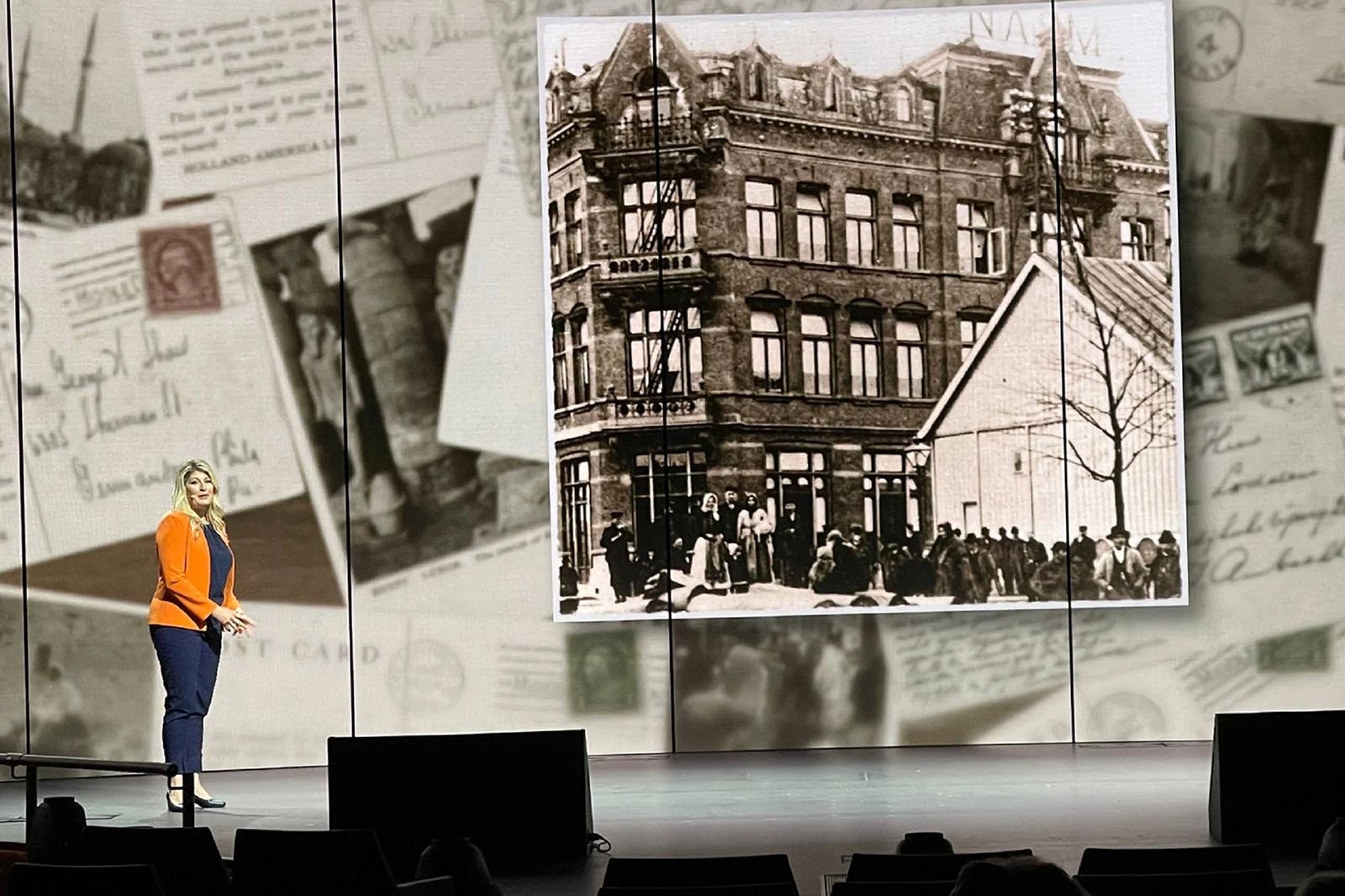
Cruise directors are the members of the ship's staff responsible for the overall passenger experience related to activities and entertainment. They are highly visible and personable — think of them as the master of ceremonies for the whole cruise.
On a large ship, the cruise director leads an activities team. On smaller ships, the cruise director might be a one-person wizard inventing and hosting all the fun things to do on board and even on shore.
Related: 16 cruise activities you don't want to miss on sea days
What does a cruise director do?

The position of cruise director varies a bit from one cruise line to another, but the list of duties is a long one, no matter the company or ship size. The cruise director engages with passengers, arranges activities and produces a range of communication content including daily activity schedules and public address announcements, as well as prerecorded and live video content to air in your cabin.
The cruise director and their staff are also an integral part of the ship's safety system, providing updates on safety issues affecting passengers. This can be as simple as rearranging activities around inclement weather and rough seas or as complicated as acting as a passenger liaison with the ship's officers during emergencies.
I once experienced that firsthand during a shipboard fire in the middle of the night. Having a calm, familiar voice chat with us on the public address system avoided panic during a scary scenario, especially when the lights went out for a bit.
Interestingly, the cruise director is also expected to help drive the ship's revenue by hosting or generating excitement for activities throughout the ship that involve purchases. Think bingo, daily drink specials and gift shop deals. The cruise director must work to design and host programs that not only help guests, but the cruise line as well — all while working within budget limits.
A cruise director's key job requirement is creativity. They must continually look for new and exciting ways to make the cruise enjoyable. This might mean hosting an arts and crafts event, working with guest speakers to find topics of interest to the guests, or helping the ship's culinary team create a fun food demonstration.
The larger the ship, the more managerial tasks a cruise director must perform. They schedule and supervise activity team members, offering training and coaching as needed, always working toward the goal of providing the best onboard experience possible.
Cruise directors on smaller ships might not have large teams to manage, but the scope of their jobs might expand to include finding and making arrangements for guest entertainers and speakers. On some small lines, the cruise director is also a performer, sharing their musical or comedic talents.
The cruise director is also a character actor, reflecting the attitude promoted by the cruise brand. On a Carnival ship, for example, cruise directors are all about the fun, while on an expedition ship, the cruise director might lean more heavily toward the edutainment experience.
Related: Which cruise ship activities should you book ahead of time?
How can a cruise director improve my cruise vacation?
In the same way Steve Harvey's entertainment is reason enough to watch "Family Feud," an entertaining cruise director can be the reason you opt to cruise on a particular ship.
Besides the entertainment value a cruise director adds to a cruise, they improve the experience for all guests on board with information about activity options as well as where and what time everything is taking place. To get the most out of any cruise experience, pay attention to the cruise director — whether they are introducing an entertainer or telling you there's a steak and lobster pool party about to happen.
The cruise director also plays a role in your shore excursion experience by making announcements regarding docking and customs clearing, as well as when and where to cue up for tender boats or tour groups . Listening to those announcements can take some of the stress out of your day in port.
How do you become a cruise director?
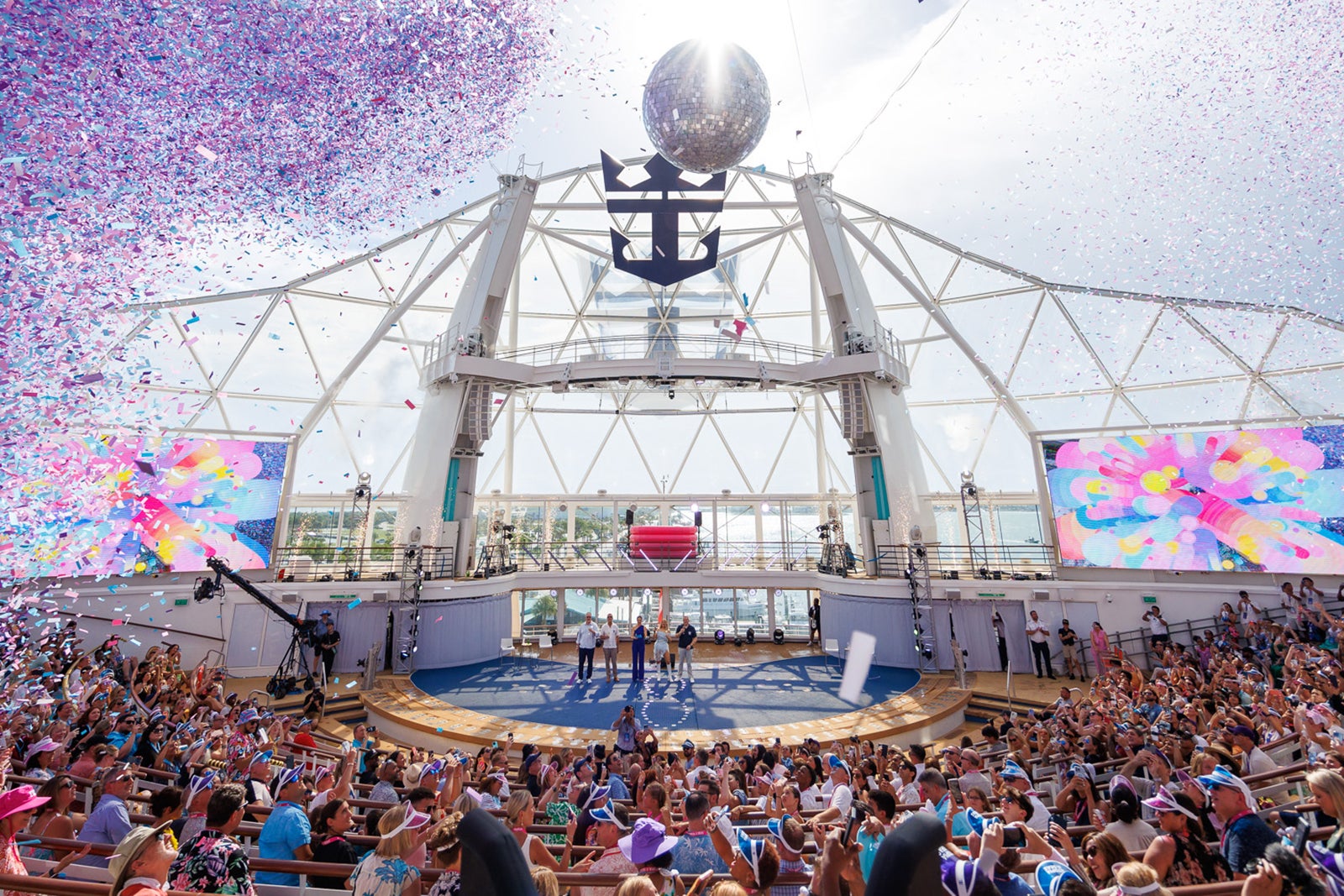
Requirements for becoming a cruise director include a background in hospitality, entertainment or recreation, a big personality and exceptional communication skills. Shipboard experience and a college degree are generally preferred.
Should you wish to apply for a cruise director job, you'll be expected to provide a demo video to show off your charisma. Most cruise directors on large ships begin their career paths either on smaller ships or as junior members of the activities team.
It's possible to become a cruise director on a small cruise ship with enough related experience and an entertaining persona. A good example would be going from activities director at a busy senior living center to signing on as a cruise director on a small river ship that caters to mostly senior guests. A work history as a tour guide, entertainer or lecturer can also help when considering a career as a cruise director.
What is a cruise director's salary?
Cruise director positions are often one of the highest paid hospitality-related positions on most ships. While salaries vary with experience and cruise line, we found online postings averaged between $5,000 and $7,500 per month. Employment contract lengths vary by cruise line. River cruise lines, for example, might only operate seasonally, shortening the annual earning potential.
Bottom line
Cruise directors are a valuable part of the cruise staff. They guide guests through a multitude of activity and entertainment options throughout the cruise. Like any good host, they tend to become part of the show, blending entertainment with information to help guests make the most of their time on board.
Planning a cruise? Start with these stories:
- The 5 most desirable cabin locations on any cruise ship
- A beginners guide to picking a cruise line
- The 8 worst cabin locations on any cruise ship
- The ultimate guide to what to pack for a cruise
- A quick guide to the most popular cruise lines
- 21 tips and tricks that will make your cruise go smoothly
- 15 ways cruisers waste money
- The ultimate guide to choosing a cruise ship cabin
Cruise embarkation day guide: How to start your sailing off smoothly

- Cruise lines typically notify guests via email or their app that they can check in and choose from several arrival times.
- Once on board, the first thing to do is go to your muster station, a designated meeting point for guests and crew in the event of an emergency.
- Staterooms on major cruise lines are typically available around 1 p.m. after crew members finish turning them over from the previous sailing.
Get more news like this delivered to your inbox by signing up for our Travel newsletter here .
When Mike Smith takes a cruise , he doesn’t waste any time. Cabins often aren’t ready for guests until early afternoon, so the 35-year-old brings a swimsuit in his backpack and changes in one of the public bathrooms after boarding. Then he grabs a drink and sits by the pool.
“I really want to use my two hours to relax, enjoy,” said Smith, who teaches American Sign Language and makes travel content on his Instagram account . “I don't want to have to idly walk around and wait for my luggage.”
While Smith – who has taken nearly 10 cruises just in the past two years – has his embarkation day routine down, first-time passengers may find themselves wondering what parts of the ship are open, when their luggage will arrive and more.
Here’s what to expect.
How do I prepare for cruise embarkation day?
Smith starts getting ready to board well before his departure date.
Cruise lines typically notify guests via email or their app that they can check in and choose from several arrival times. Smith said he tries to get the “earliest boarding time possible.”
“I'll try my very best to do it that day when they (say) you can,” he said. Cruise lines encourage guests to check in ahead of time.
“Due to government regulations requiring cruise lines to submit final departure manifests at least 60 minutes prior to sailing, guests are requested to complete check-in no later than 3 days prior to their cruise,” Royal Caribbean International said on its website , for example. “If you do not complete check-in 3 days prior, you will be required to complete this process at the pier at least two hours prior to the published sailing time.”
Smith also likes to look over the deck plans for the ship, which are usually available online, to familiarize himself with the layout.
“Otherwise, sometimes day one becomes, like, walking to one end of the ship and going, ‘Oh, wait, it's not over here, it's over there,’ and then turning around,” he said. “And I think mitigating any kind of frustration is always a good way to start a cruise.”
What happens on cruise embarkation day?
At the port, passengers can check luggage with a porter and go through security before getting on the ship.
Once on board, Smith said the “first, first, first, first” thing he does is go to his muster station, a designated meeting point for guests and crew in the event of an emergency. Muster drills used to be more involved , but the process can usually now be completed by watching a safety video and checking in at the assigned locale. All guests must do so before the ship sets sail.
“I think a lot of people, especially people who haven’t cruised in a long time, they might have my childhood trauma, which was putting on that life jacket and standing outside by the lifeboats and listening to the horn blow and going through all those instructions,” he said. “And every cruise I've been on now for the past two years, everything's in the app.”
In Smith’s experience, staterooms on major cruise lines are typically available around 1 p.m. after crew members finish turning them over from the previous sailing.
Checked luggage is left outside guests’ cabins, but delivery times can vary. Smith tries to bring enough items in his backpack – which he carries with him during boarding – that he doesn’t need anything from his suitcase until the evening.
Once his bags arrive, he “1000%” unpacks everything that day. “I like to do it; my boyfriend is adamant about it,” he said. “He's the driving force.”
Once the suitcases are empty, they slide them under the bed, which can create some extra room for guests in the sometimes tight quarters of cruise cabins.
What’s open on embarkation day?
Smith has found that many onboard amenities are accessible to guests on embarkation day.
But there is one he likes to avoid just after boarding: the buffet. Many passengers tend to go straight there, causing it to get packed.
He prefers to eat before getting on the ship, so he doesn't have to worry about grabbing food right away.
Other venues, like specialty restaurants, may also not be open until dinner on the first day of a cruise.
From cell service to Wi-Fi: How to stay connected on a cruise ship
And while large cruise ships often have a range of retail stores, they generally aren’t open while in port. Smith recommended that guests bring items like sunscreen and any medications they might need in case the shops are closed or they don’t have what they’re looking for.
He also uses time after embarkation to make reservations for specialty dining and peruse the entertainment schedule, making notes on his phone of the activities and shows he and his boyfriend want to attend.
“And then I just put whatever we're doing there so we don't have to really think about anything because the last thing I really want to do on vacation is think a lot,” Smith said.
Nathan Diller is a consumer travel reporter for USA TODAY based in Nashville. You can reach him at [email protected].
The Key Points at the top of this article were created with the assistance of Artificial Intelligence (AI) and reviewed by a journalist before publication. No other parts of the article were generated using AI. Learn more .
TikTokers Matt Howard and Abby Howard Slammed for Leaving Toddlers in Cruise Ship Cabin
Social media influencers matt howard and abby howard faced criticism after sharing they left their sons alone in their cruise ship room while they ate dinner..
Matt Howard and Abby Howard are cruising into a new controversy.
The married TikTokers , who post under the joint account Matt & Abby , shared that on a recent cruise with their sons Griffin , 2, and August , 13 months, they left the boys asleep in their stateroom while the two of them went to dinner, adding they were monitoring them via FaceTime.
"So we ended up taking them for 5 nights," Abby wrote in a since expired Instagram Story , "and it became apparent that they weren't enjoying it and therefore we weren't either."
She explained that the couple— who married in 2019 during their sophomore year of college—switched their dining time to after their children's bedtime and "FaceTimed the monitors while we ate."
The 25-year-old noted that, "Baby monitors don't work on board unless you're only like 10 feet away."
And she was happy with the decision she and her 26-year-old husband made, writing, "That worked out muchhhh better for everyone! :)"
However, soon after sharing the update, the Unplanned Podcast cohosts found themselves the subject the criticism around the internet.
"Obviously not enough people take true crime seriously," TikToker yourfinestpardon said in a video posted Sept. 15 . "It's terrifying. Like, what happens if you come back from eating dinner and you have no idea how your kids are doing? How long—if there was an emergency—would it take you to get back to the room?"
And users were just as outraged in the comments of her video, with one writing, "They would legitimately be in jail right now for abandonment if this was on land."
Another wrote, "I'm just saying, what other situations do they leave their kid alone," while one TikToker added, "AND TO ANNOUNCE YOU LEFT THEM ALONE ON THE CRUISE."
In response to the backlash, a source close to the couple told E! News that the pair were traveling with Abby’s family members, who had rooms right next door to each other on the ship. According to the insider, they were taking turns being with the kids, and the boys were never alone. The source added that the use of baby monitors was an additional precaution.
E! News has reached out to Matt and Abby for comment .
This is not the first time the podcasters have made headlines with a controversial decision. Earlier this year, Matt and Abby declared that they would not be celebrating Father's Day, because the annual holiday always fell around Matt's birthday, making celebrations feel redundant.
"Last year was June 18, which is Matt's birthday," Abby explained on a May episode of their podcast , "so he had Father's Day and his birthday on the same day and I will say, I did kind of combine the holidays."
Matt noted that having the joint celebrations was "kind of was a bummer."
"Hey, but you know what?" he continued. "This year we're boycotting Father's Day for the month of June, and celebrating it three months after my birthday."

Royal Caribbean Returns to Labadee Next Month

Doug Parker
- September 16, 2024
Royal Caribbean International plans to resume visits to Labadee, Haiti in October 2024 after temporarily halting trips earlier this year due to violence and instability.

Labadee, a private destination exclusive to the cruise line, has been off itineraries since March 2024 , due to growing unrest, including a massive prison break, which prompted safety concerns.
However, with recent regional improvements—such as the return of airlines and an increase in peace-keeping efforts—the cruise line is optimistic about resuming operations.
Adventure of the Seas, First Ship to Resume at Labadee on October 8, 2024

In a message to a guest, Royal Caribbean confirmed the return, saying, “Labadee is one of our fan-favorite private destinations and we are ready and excited to return to Labadee in October 2024!”
Other Royal Caribbean ships , including the Freedom of the Seas and Independence of the Seas , will also visit Labadee in October, followed by the Grandeur in November.
These ships will continue to include Labadee in their winter Caribbean itineraries.
Royal Caribbean is the first major cruise line to restart visits to Haiti. Celebrity Cruises, a sister brand, will not return to Labadee until February 2025.

Labadee has been a beloved stop for cruise guests, known for its beaches, zip line, and water activities. The return of these voyages is seen as a positive sign for Haiti’s tourism industry, which has struggled in recent years due to political instability.
Haiti’s political instability worsened after the assassination of President Jovenel Moïse in July 2021. This led to widespread unrest and security concerns, prompting Royal Caribbean to cease its visits to the nation in early 2024.
- Royal Caribbean Returns to Private Destination Labadee [PHOTOS]
- Royal Caribbean Replacing Labadee Calls Due to Unrest in Haiti
Recent Posts
- Carnival Vista Returns to Service Following Propulsion Repairs
- Prince Tribute Show to Headline Norwegian Aqua Entertainment Lineup
- New Carnival Cruise Solar Project Helps Power Barcelona Homes
- Disney Cruise Line Tightens Birth Certificate Requirements for Kids Under 16

Bringing you 15 years of cruise industry experience. Cruise Radio prioritizes well-balanced cruise news coverage and accurate reporting, paired with ship reviews and tips.
Quick links
Cruise Radio, LLC © Copyright 2009-2024 | Website Designed By Insider Perks, Inc

IMAGES
VIDEO
COMMENTS
Decision-making is a key part of being a cruise ship captain. "There are never two days alike," says Belinda Bennett of life on board Wind Star. "Broken machinery has to be dealt with, and ...
A cruise ship captain is a professional who leads a crew in the safe operation of a sea vessel. Cruise ships specifically transport tourists who enjoy recreational activities while on the ship, and their safety and enjoyment are usually the captain's and crew's priority. Cruise ship captains are responsible for those aboard their vessel ...
The main thing is that cruise ship captains work long, tiring hours. They work 10 weeks in a row, then have 10 weeks off. However, in those 10 weeks of work, they are required to be on-call 24/7 ...
Cruise ship captains seem pretty near the top of the list in the glamorous job category. But, the reality is a tad less glam and a whole lot more work than you might think. Effective July 1st.
Every evening, whether the Celebrity Edge cruise ship is crisscrossing the Caribbean or meandering around the Mediterranean, Captain Kate McCue writes night orders for her team. She always ...
The qualifications required to become a cruise ship captain are not much different from that of merchant ship captains. A degree or diploma in Nautical Science is followed by onboard training as cadets or apprentice officers lasting several months. Thereafter, the aspiring candidates are considered eligible for the 2nd Mate examination, on ...
1. Work as a marine captain. You must hold the position as marine captain for a number of years before applying to become a cruise ship captain. Develop an excellent track record. In the vast majority of cases, marine captains are promoted after serving as deck officer or third mate on that ship.
There's so much technology on such big ships that we can no longer rely just on our memory. Captain José explains the intricacies of running a cruise ship. - Photo by Simon Duvall. It is safe to cruise, and now people can feel even more relaxed and more safe, because we have an extra set of eyes on the Bridge.
The captain is solely responsible for the vessel's navigation, and they may involve themselves in steering the ship, particularly when docking. There are five primary requirements needed to become a cruise ship captain. Education, qualifications, and training. Career experience working on ships. Industry qualifications and certification.
To become a cruise ship captain, you will need a high school diploma and a Bachelor's Degree (preferably in maritime studies). A Master's Degree is also required by most ships. You will need years of experience on a sea vessel, including outstanding on-the-job training. You will also need a captain's license from a Federal Maritime Authority.
Being a captain of a cruise ship is a prestigious and challenging career that demands a high level of responsibility, leadership, and maritime expertise. It offers the opportunity to travel the world and experience a unique blend of adventure and professionalism. However, it also requires a strong commitment to safety and a willingness to work ...
Cruise Ship Management Hierarchy. On today's cruise ships, in addition to the Captain being in charge, there are a handful of senior officers that manage the ship's operations and report to the Captain. These jobs include Staff Captain, Chief Engineer, Hotel Director, Cruise Director, Doctor, Food and Beverage Manager, and Staff Engineer.
A cruise ship captain oversees all onboard operations on a cruise ship. Your duties include ensuring the safety of passengers and crew during a voyage. You also navigate the vessel, make decisions about ship operations, and delegate tasks to other crew members. Your responsibilities include ensuring that crew members follow both technical ...
How to become a cruise ship captain. If you want to know how to become a cruise ship captain, there are some key steps to take. To keep everyone on board a ship as safe as possible, it is important for cruise ship captains to get the right qualifications and experience. The main steps for becoming a captain include: 1. Obtain an education.
The average salary of a cruise Captain is $130,000 per year. Salaries range from $52,000 to $190,000. This is dependent on the Captain's experience, and the cruise line for which they work. According to Cruise Critic (source) the average salary of a cruise ship Captain is $150,000 per year. Pay Scale (source) estimates an average salary of ...
Taking the average salary of cruise ship captain at US$93,328, this equates to a monthly average salary of US$ 7777.33. We have also worked out the monthly salaries for those cruise ship captains earning higher annual salaries as follows: $125,000 a year equates to US$ 10,416 a month. $150,000 a year equates to US$ 12,500 a month.
The average salary for a cruise ship captain is $88,730 per year. Salaries can vary for several reasons, such as a captain's work experience, certifications, licensure, employer and other accreditations. According to the U.S. Bureau of Labor Statistics, the employment growth rate for water transportation workers, which includes ship captains ...
An architect captain has an annual salary of $91,389, international cruise ship captains receive $82,873 per year, and a port captain takes home $76,894. While the salary may initially appear low ...
McCue went on to attend California Maritime Academy and worked for Royal Caribbean International for 12 years. At age 37, she became the first American woman to captain a megaship. In April, McCue picked up a new captaining gig on Celebrity Cruises' Celebrity Equinox, a 2,850-passenger ship traveling to Puerto Rico, St. Maarten, St. Thomas ...
Cruise ship captains' salaries can vary widely, from as low as $48,000 to upwards of $200,000 annually. This broad range is influenced by several key factors: Experience: Veterans of the sea command higher salaries. The top earners often have decades of maritime experience, reflecting the high level of trust and responsibility placed in their ...
Captain salary in the US. Among other factors, the salary of a cruise ship captain varies significantly based on their location. In the United States, the average salary for a cruise ship captain is approximately $94,000 per year, with variations depending on the city and state.Cities in California, such as San Jose and Santa Clara, offer the highest salaries, reaching an average of $120,000 ...
An average cruise ship captain's salary is $95,000, in a salary range of $50,000 to $190,000. New cruise ship captains may start at $50,000, while more experienced captains can make over $150,000. The exact salary for a cruise captain depends on the captain's experience, education, the cruise line they work for, and the size of the ship ...
The Salary of the Cruise Ship Captain. According to recruitment specialists, Indeed, a Cruise captain can expect to earn an annual salary ranging from $92,000 to $190,000. However, this figure fluctuates based on factors such as experience, qualifications, the employer, and more. Some captains might pocket as low as $48,000 a year, while others ...
Kate McCue (born January 6, 1978) [1] [2] is an American cruise ship captain. She is currently employed by Celebrity Cruises and is the captain of the Celebrity Beyond.. When she became the commanding officer of Celebrity Summit in 2015, it was the first time that an American woman had been named captain of a "Mega" cruise ship.Prior to her time at Celebrity, she had worked as an officer for ...
Cruise ship Carnival Spirit underwent checks on its hull after it struck an "errant piece of drifting ice" while sailing in Tracy Arm Fjord, Alaska.
The cruise director is also a character actor, reflecting the attitude promoted by the cruise brand. On a Carnival ship, for example, cruise directors are all about the fun, while on an expedition ship, the cruise director might lean more heavily toward the edutainment experience. Related: Which cruise ship activities should you book ahead of time?
Staterooms on major cruise lines are typically available around 1 p.m. after crew members finish turning them over from the previous sailing. Get more news like this delivered to your inbox by ...
TikTokers Matt Howard and Abby Howard Slammed for Leaving Toddlers in Cruise Ship Cabin. Social media influencers Matt Howard and Abby Howard faced criticism after sharing they left their sons ...
Royal Caribbean's Utopia of the Seas only recently entered service in July of 2024, but the Oasis-class vessel is already getting some complaints on the internet.. One recent guest, who was just ...
The first ship to call at Labadee will be the Adventure of the Seas, arriving on October 8, 2024.This 3,807-passenger vessel will sail a 6-night Eastern Caribbean voyage from Port Canaveral ...